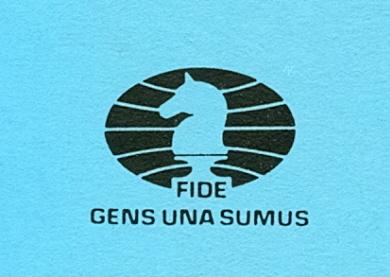
Edward Winter

In the 1986 FIDE Presidential Election the incumbent, Florencio Campomanes, was challenged by a ticket comprising Lincoln Lucena and Raymond Keene. Voting was due to take place at the FIDE General Assembly’s session in Dubai in November 1986. Campomanes’s decision in February 1985 to terminate the world chess championship match between Karpov and Kasparov after 48 games had prompted much press criticism, but to what extent had it weakened him?
In July 1986 there appeared the first of a series of ten FIDE Facts sheets which played an important, and possibly decisive, role in the outcome of the election. They were distributed principally to national federations but also gave rise to some wider discussion. The full texts of all ten documents are given in the present article. Further documentary material based on fact, whatever the writer’s stance may be, is welcome.
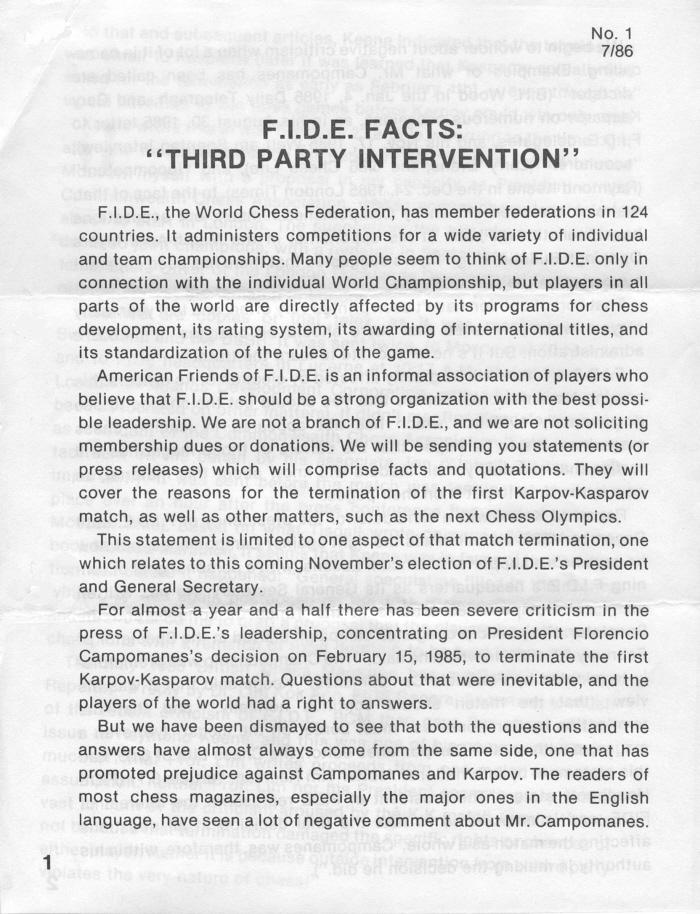
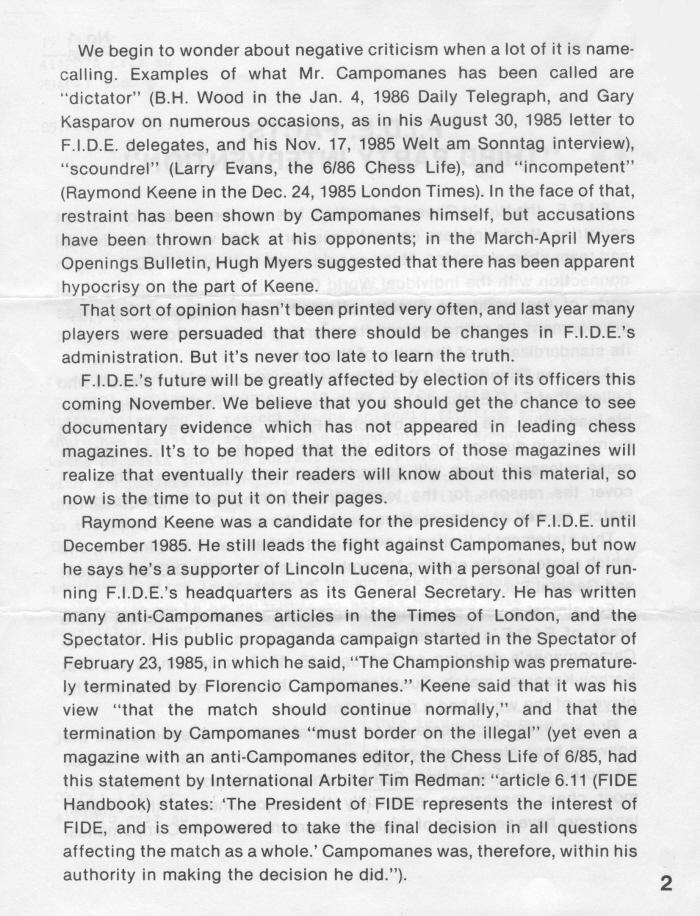
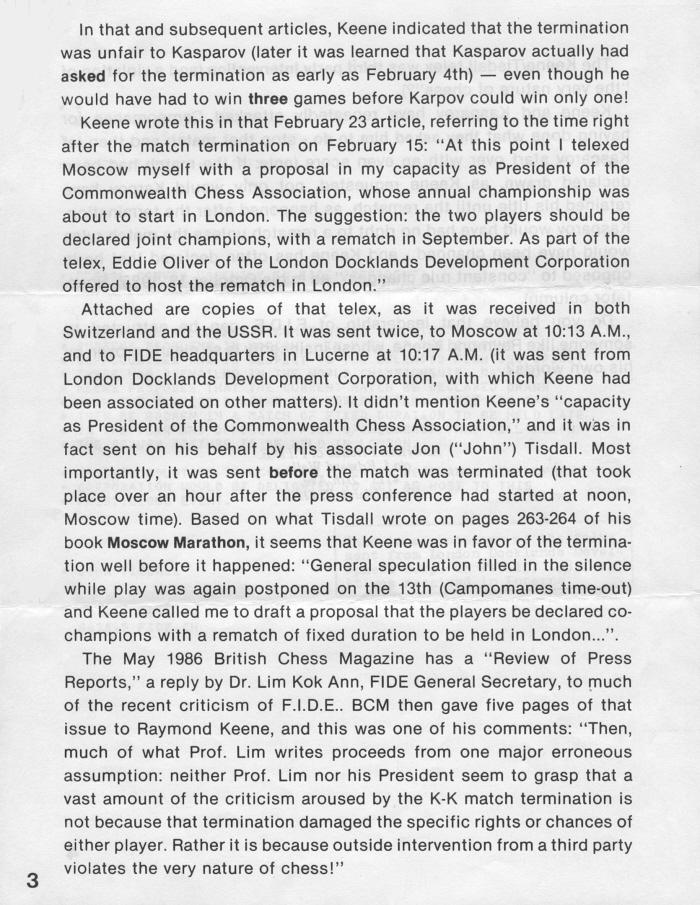
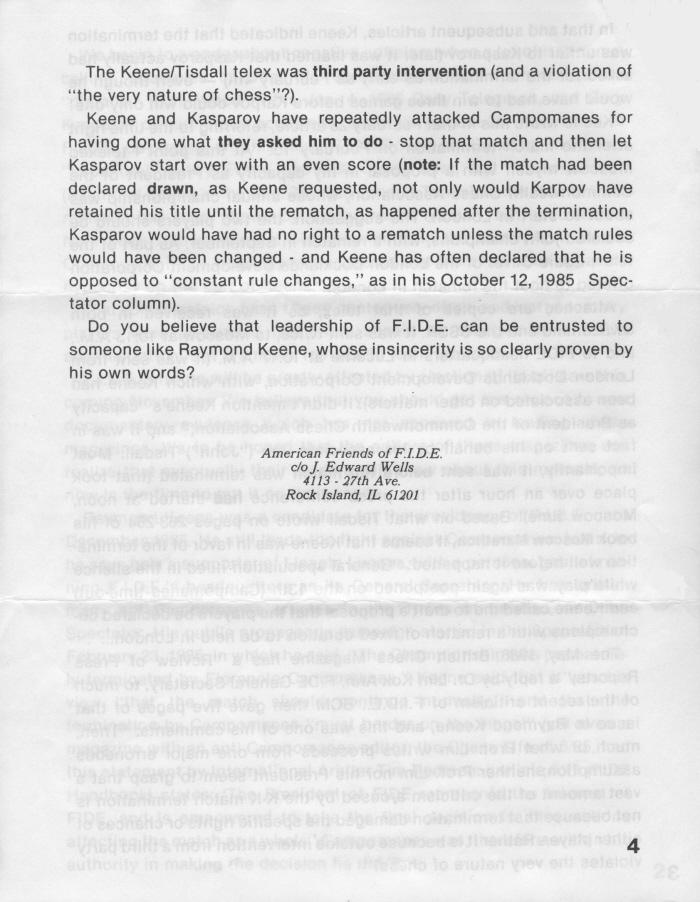
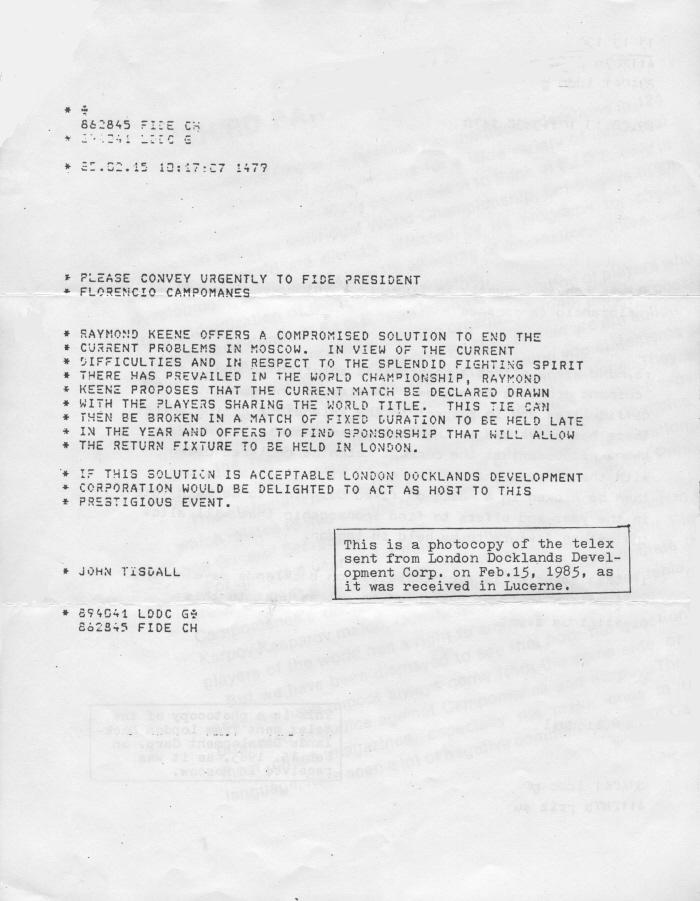
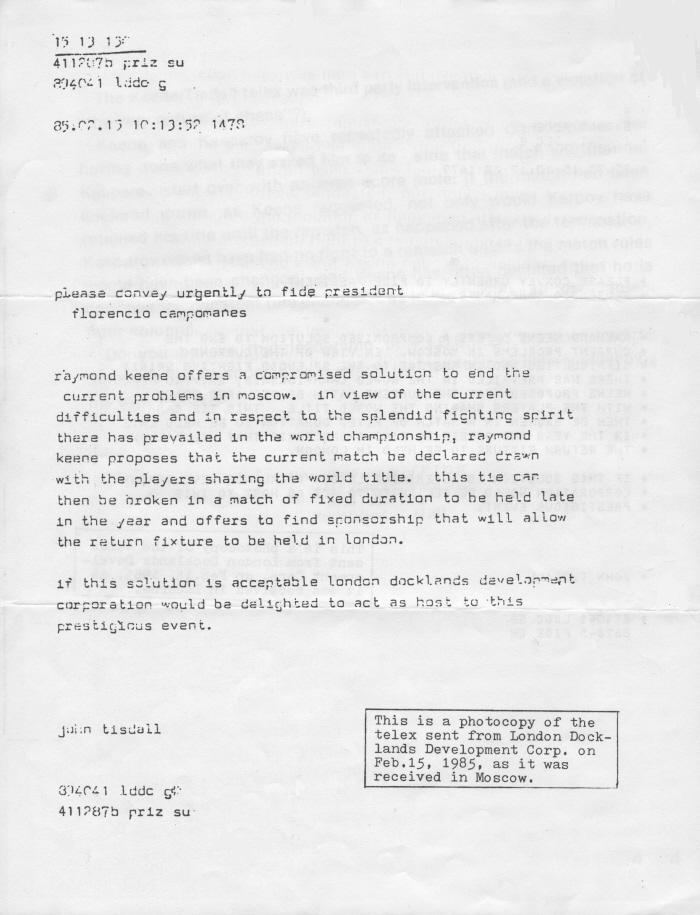
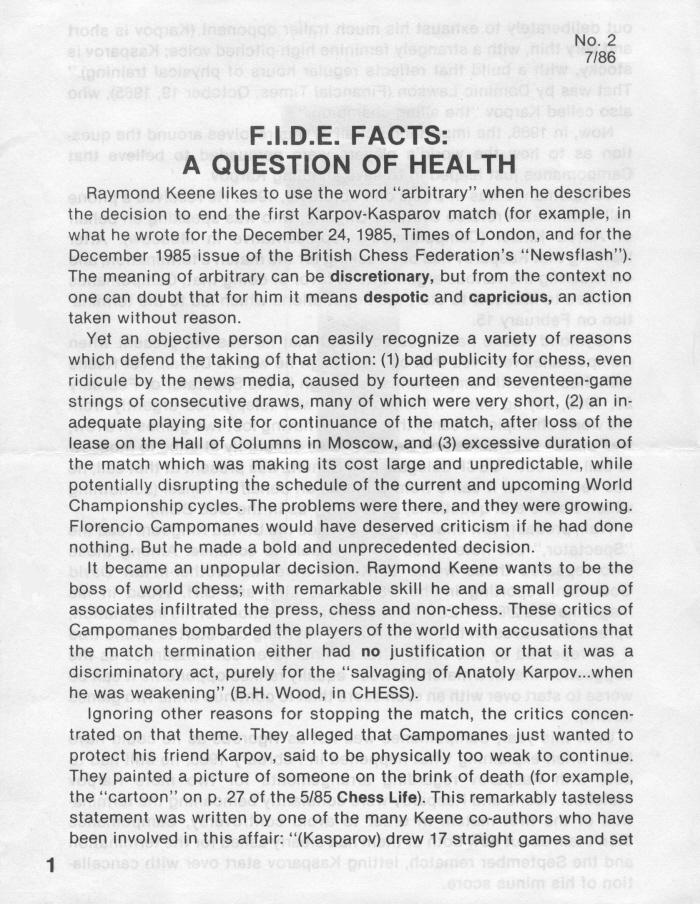
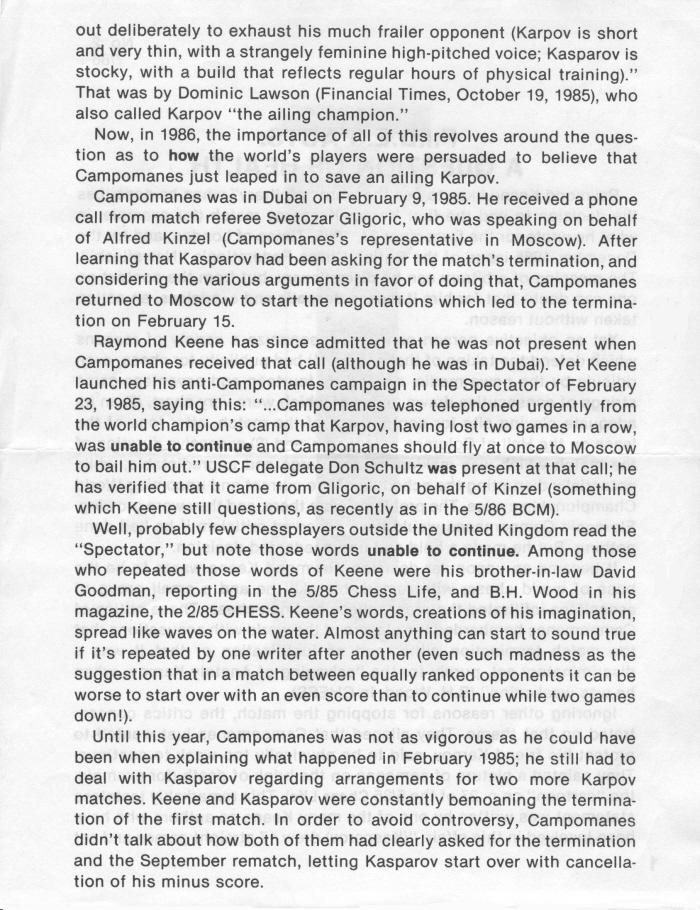
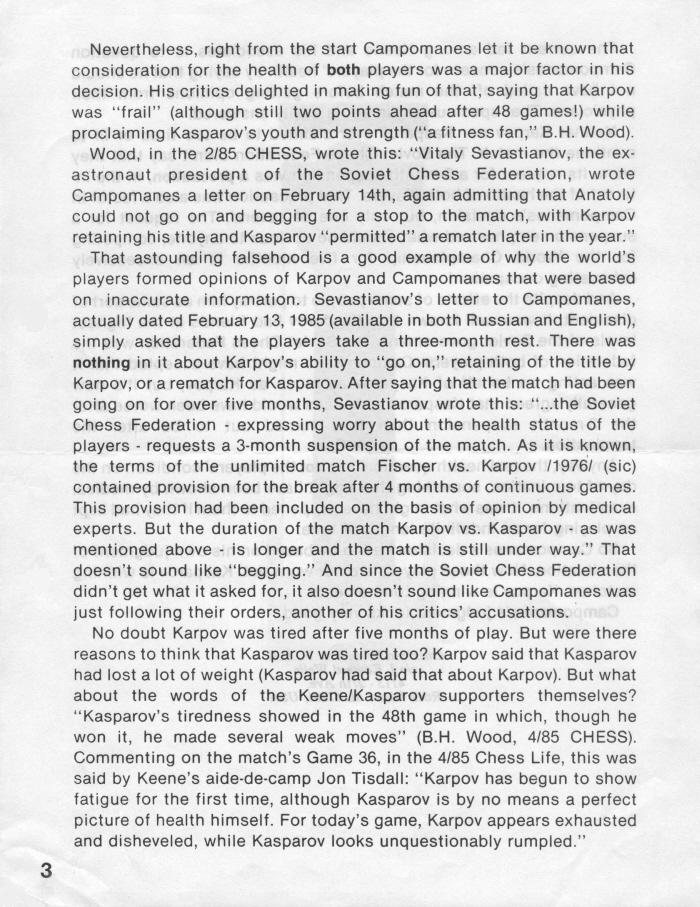
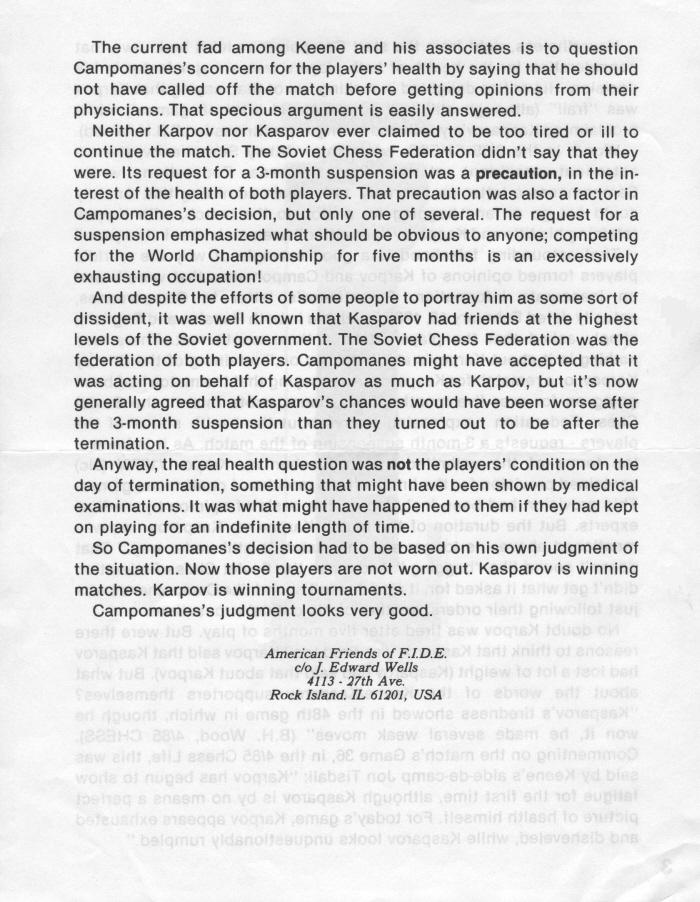
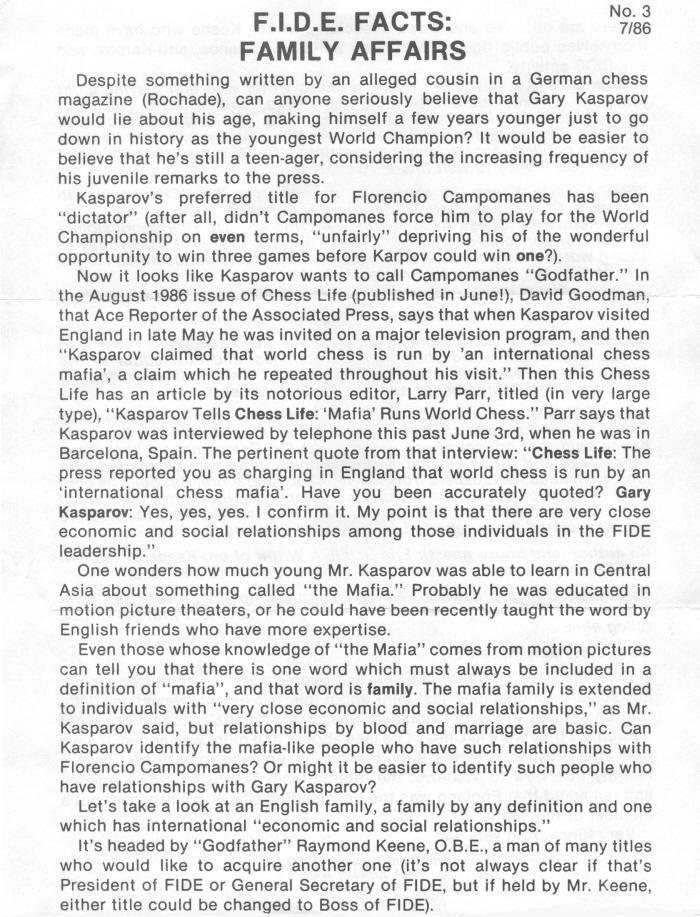
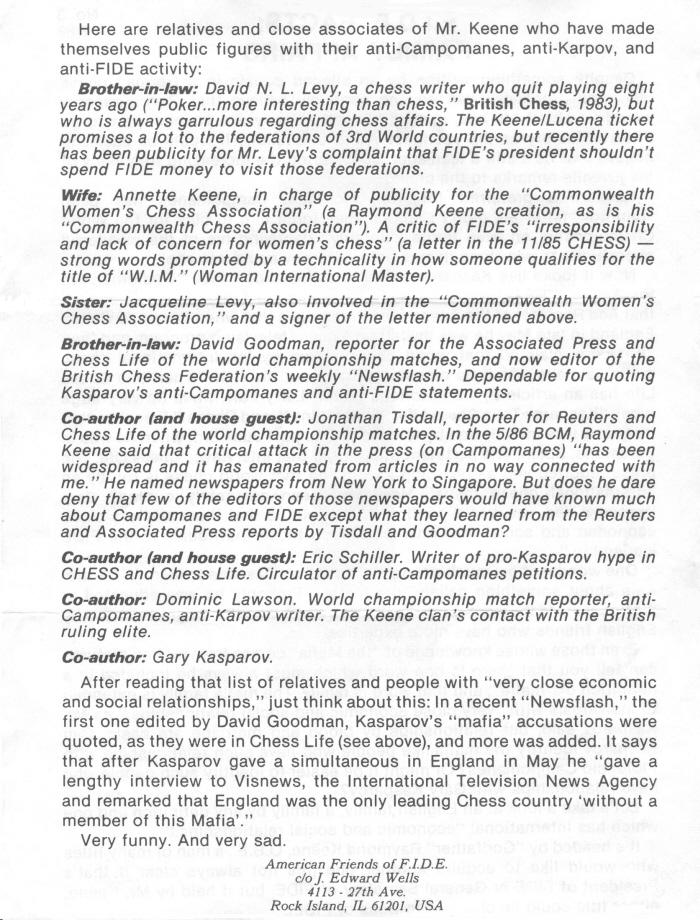
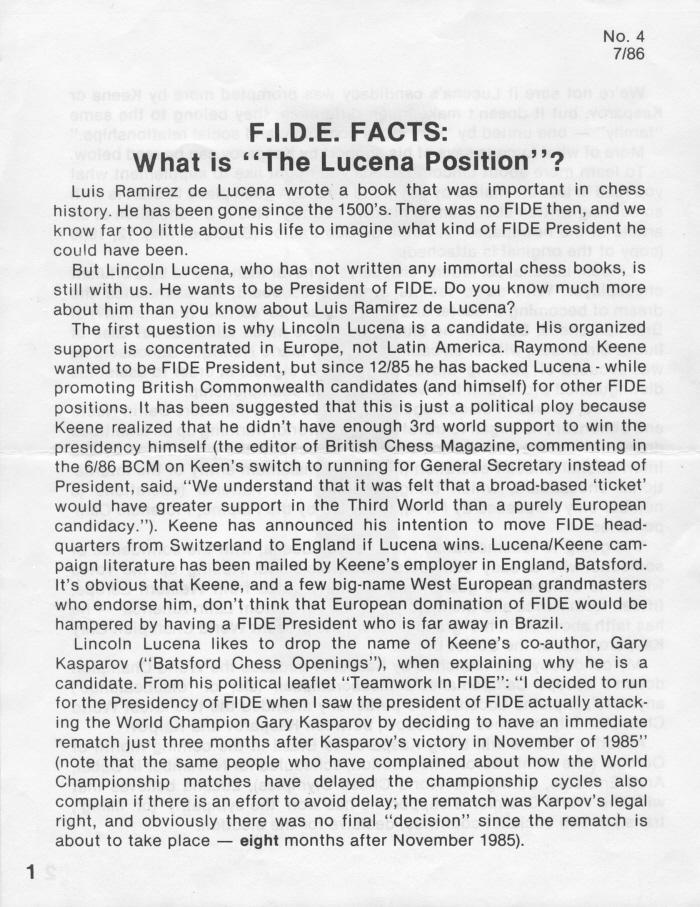
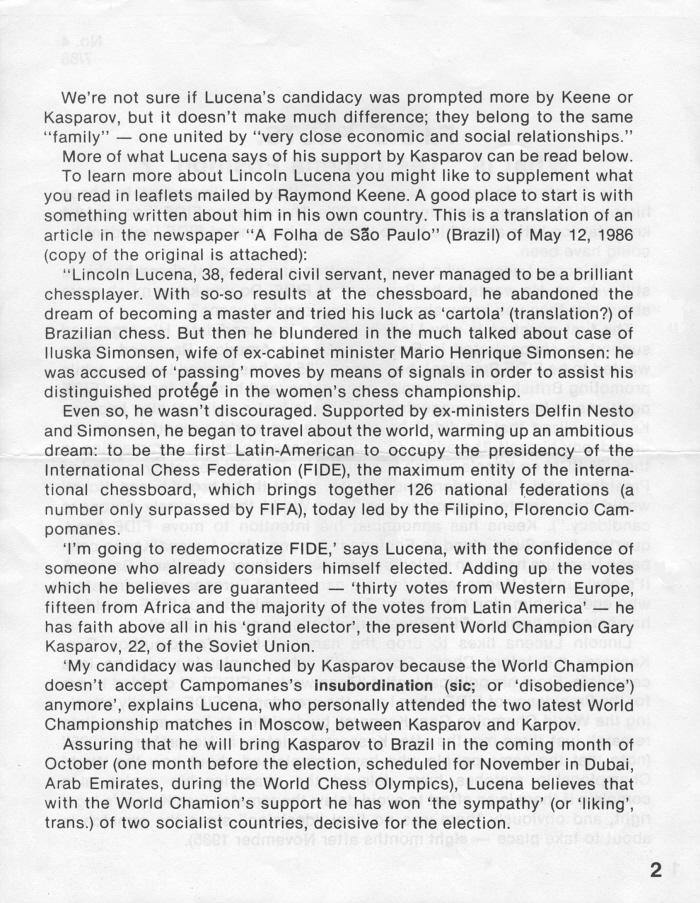
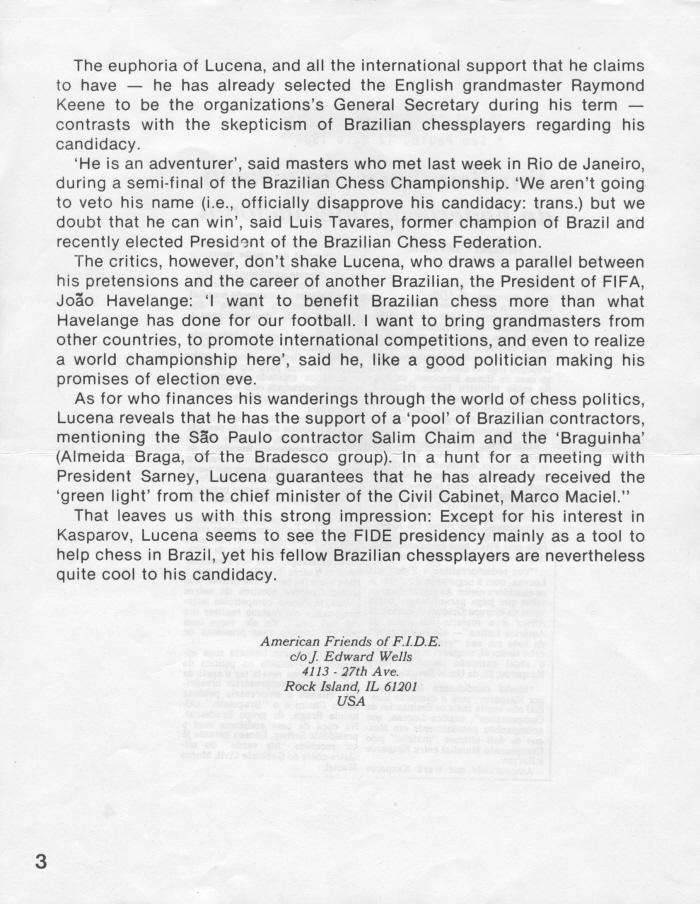
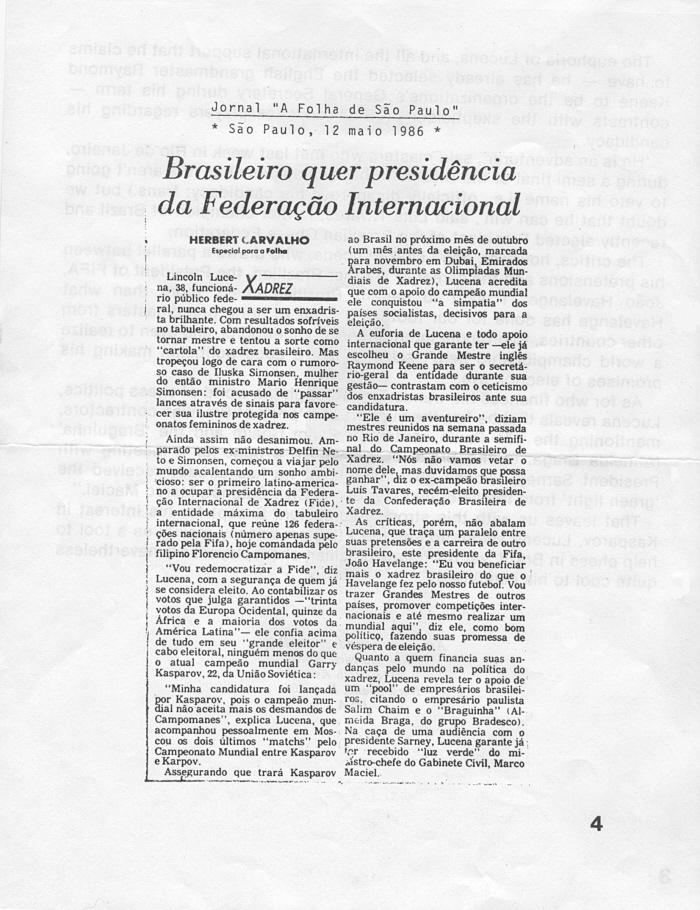
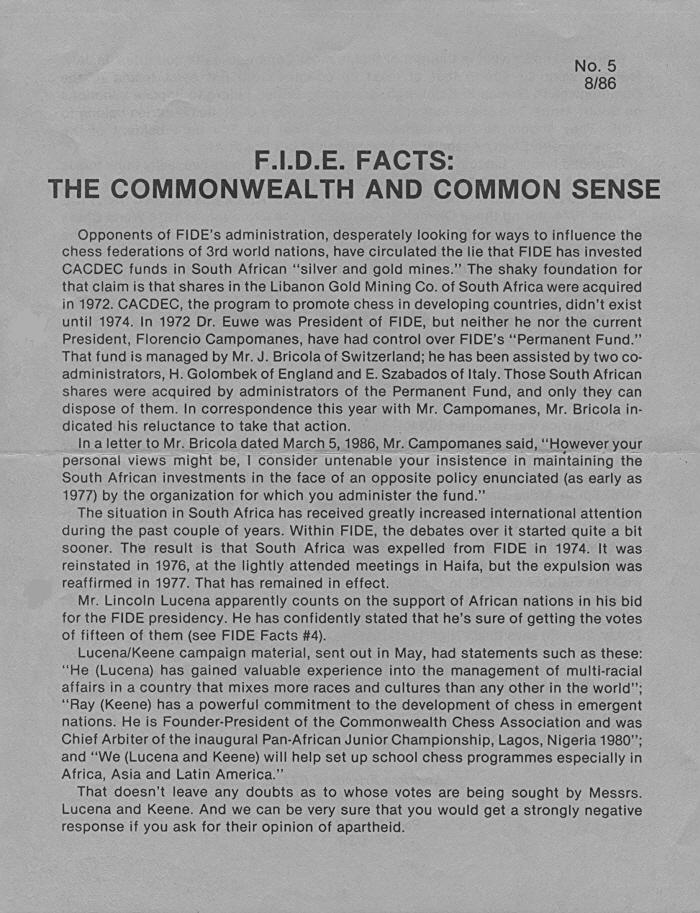
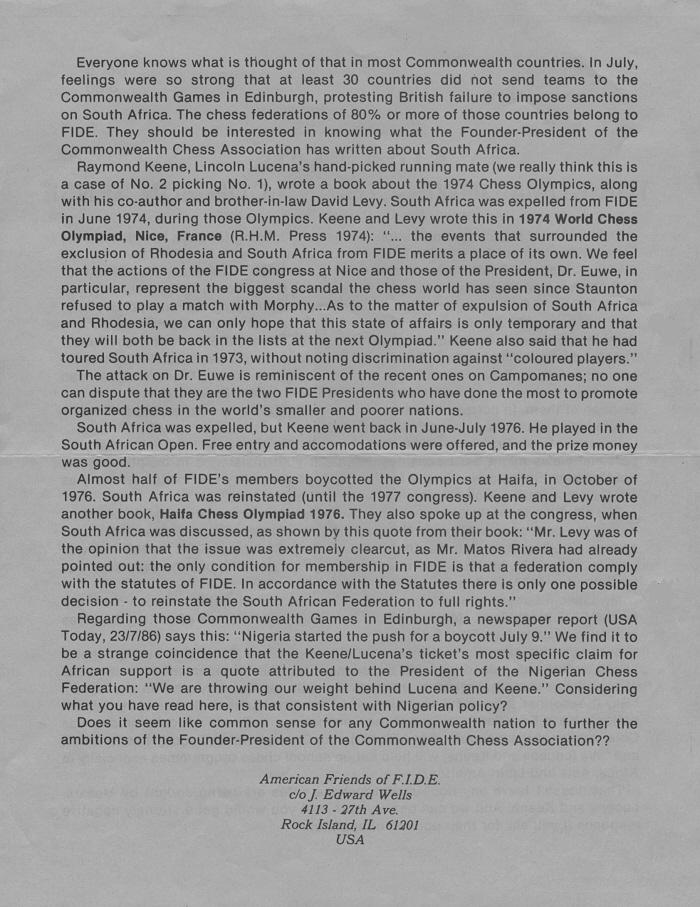
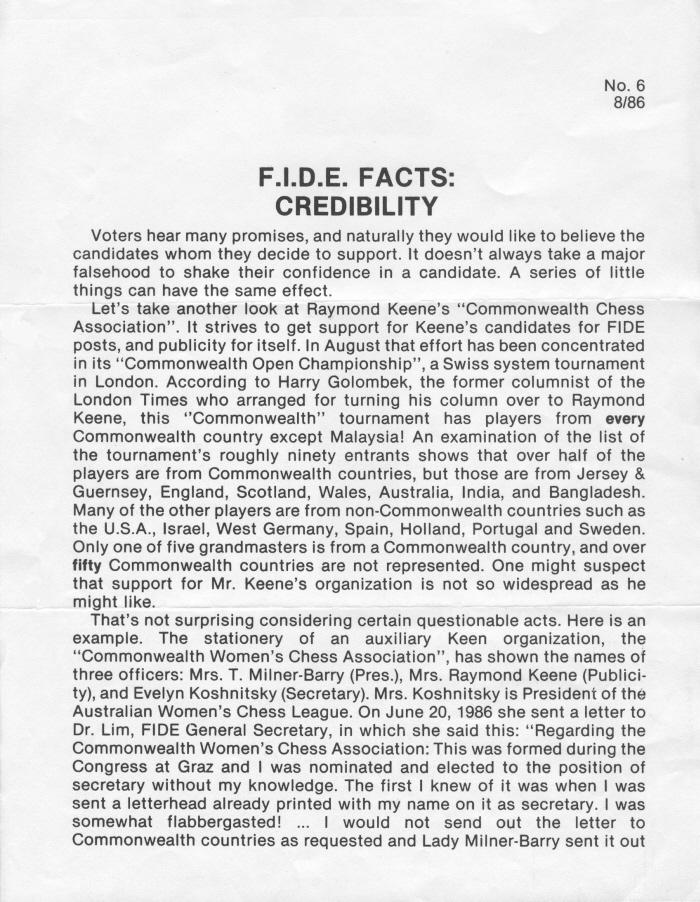
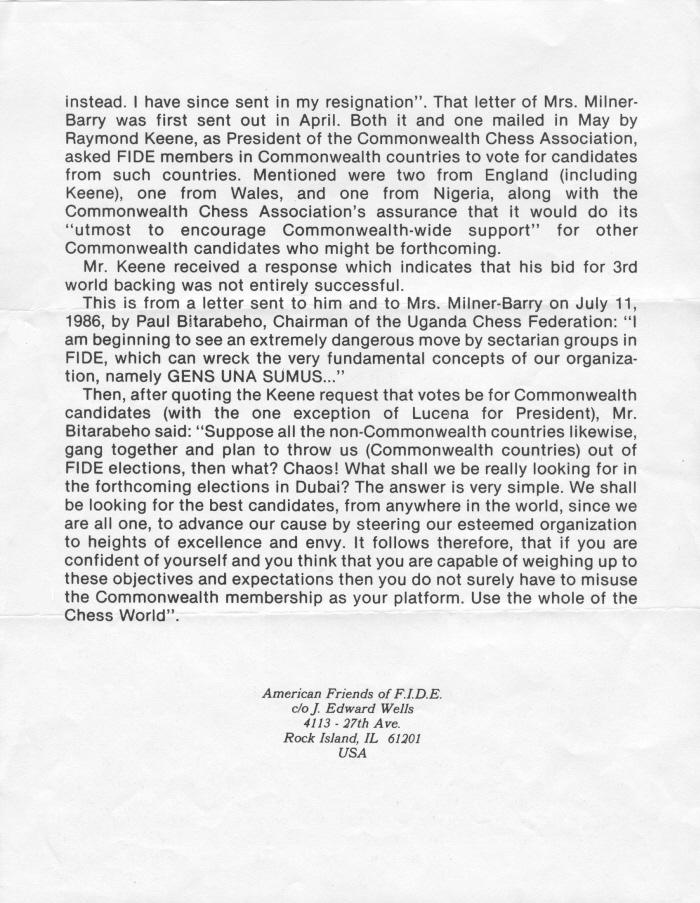
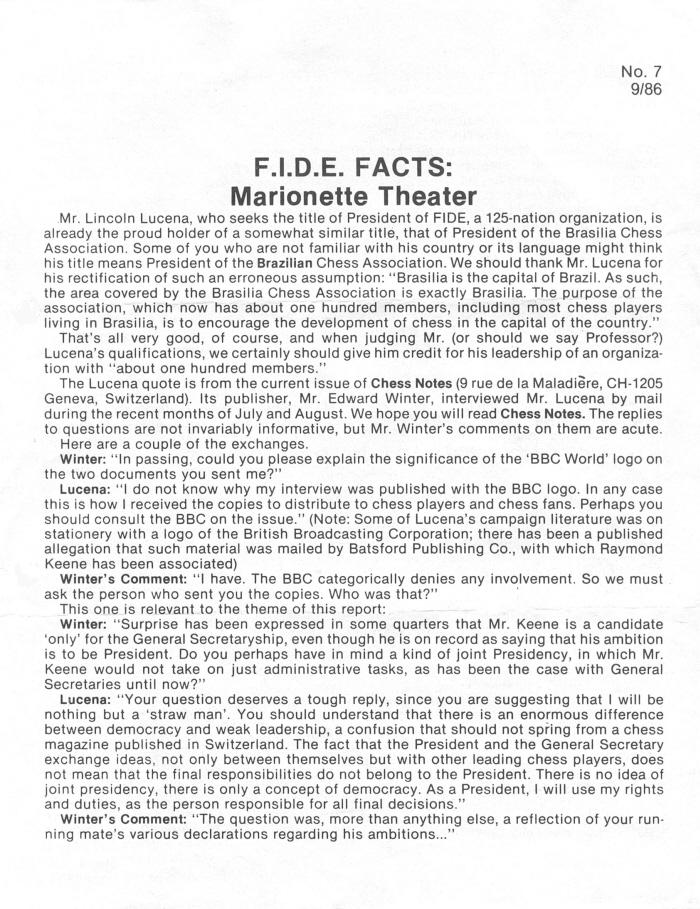
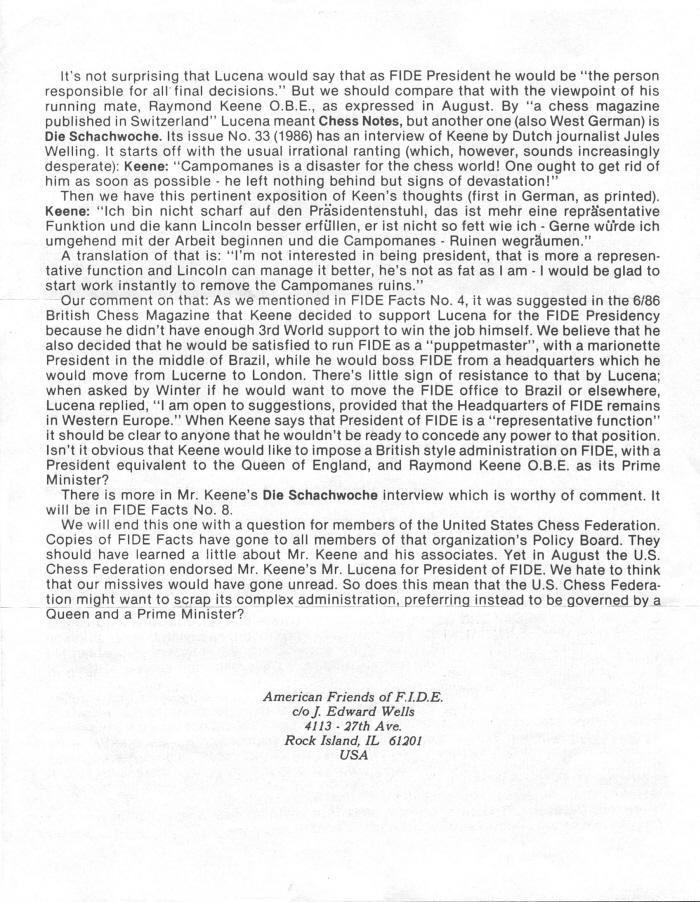
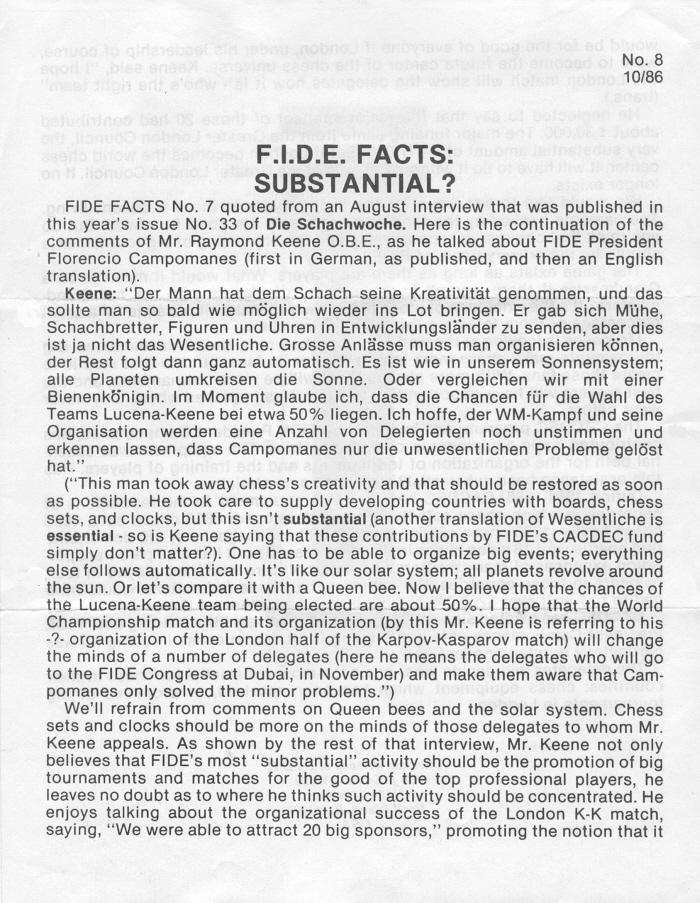
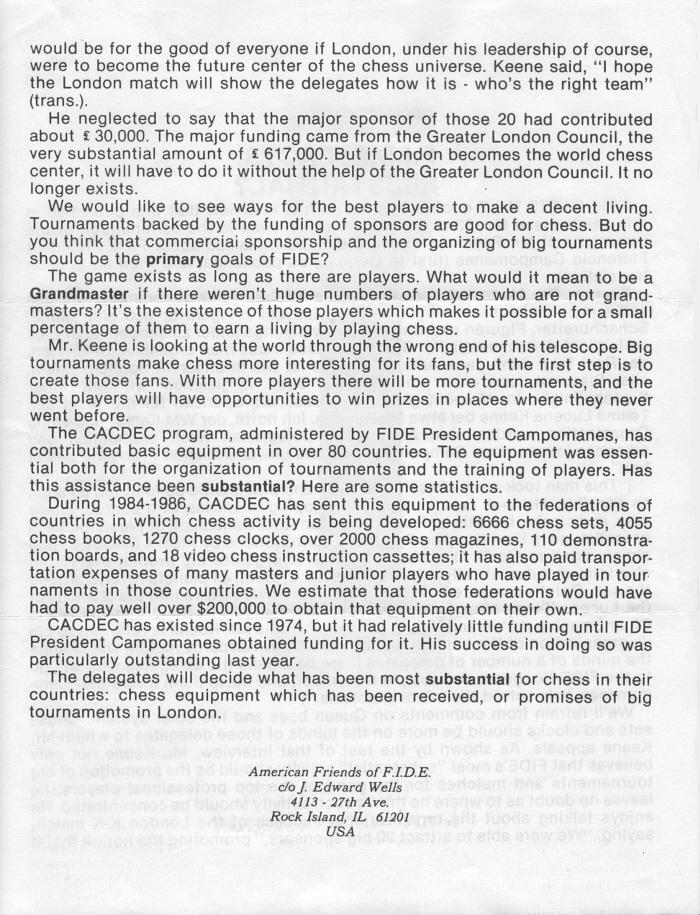
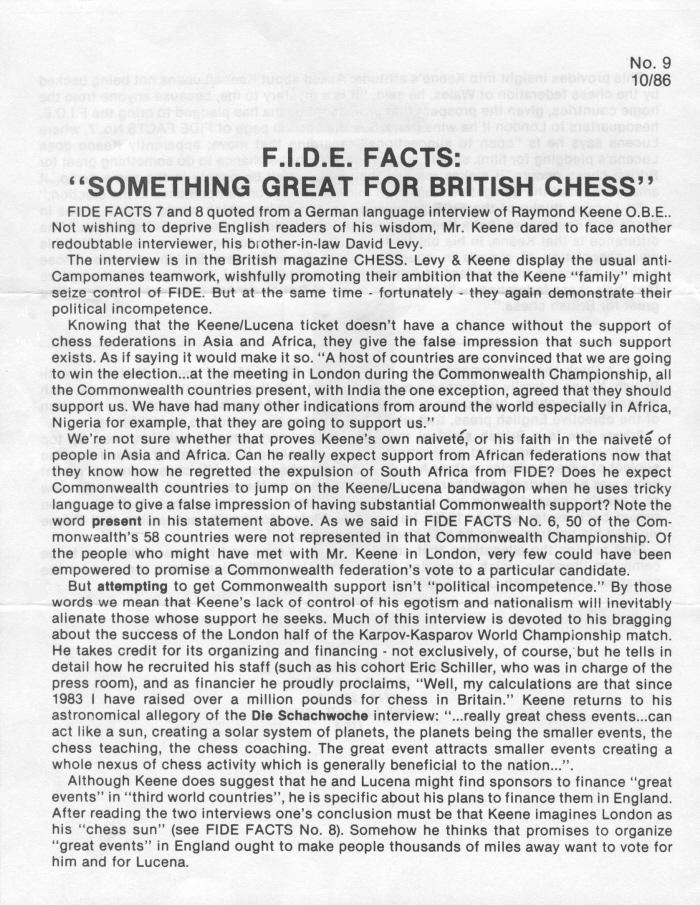
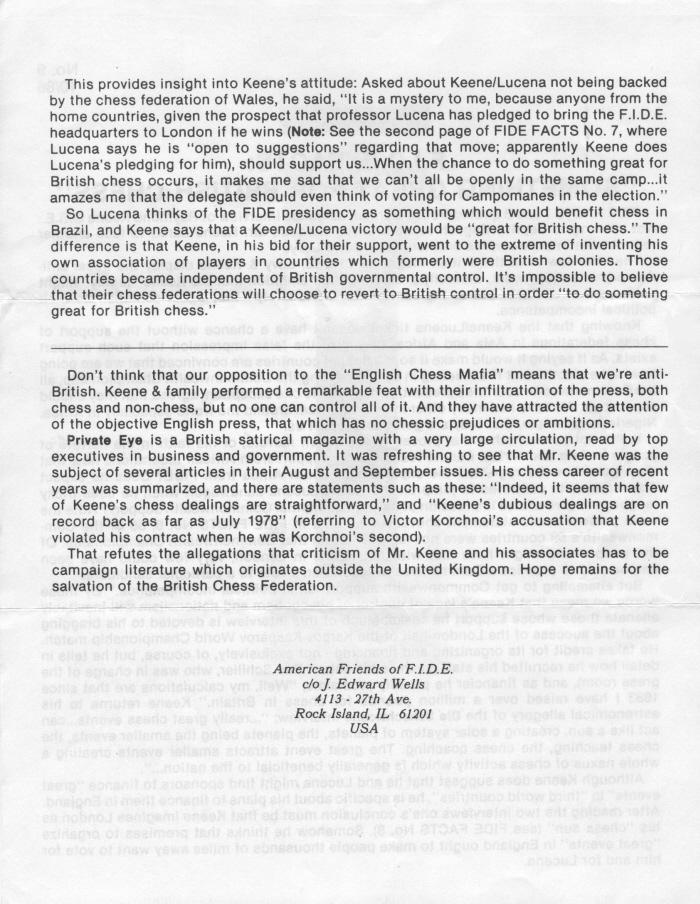
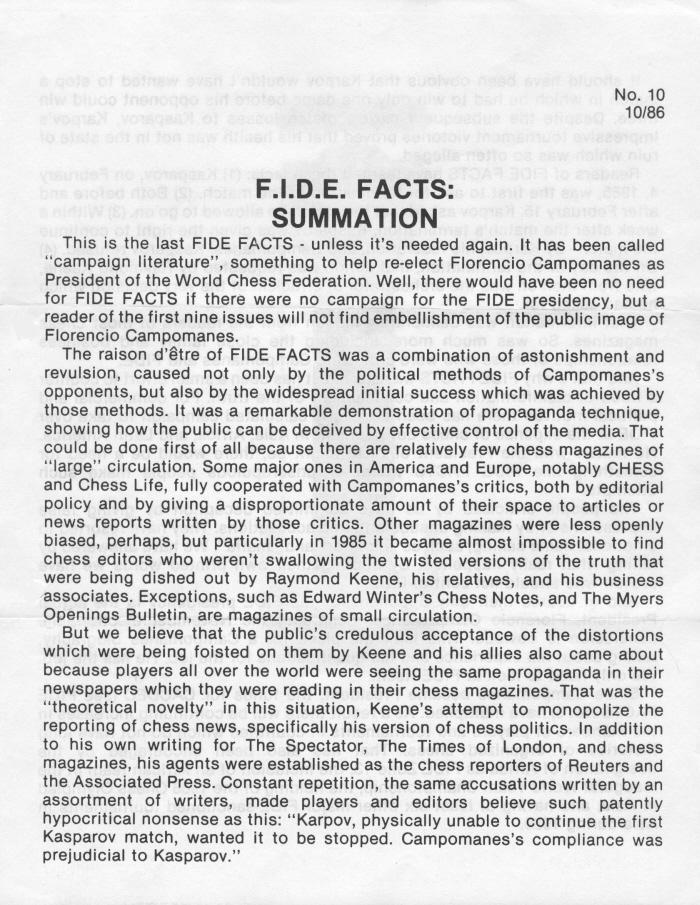
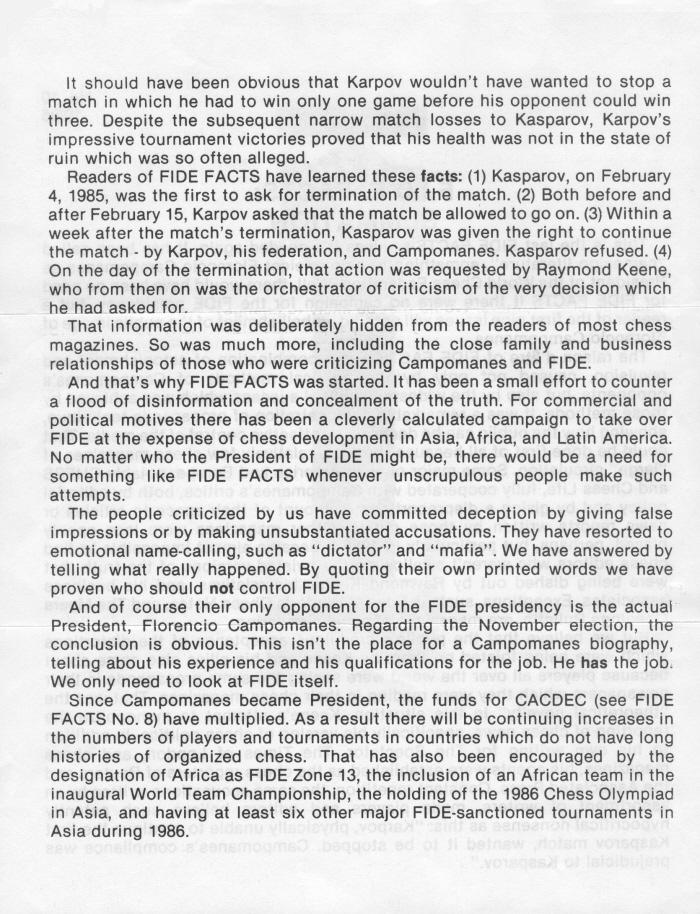
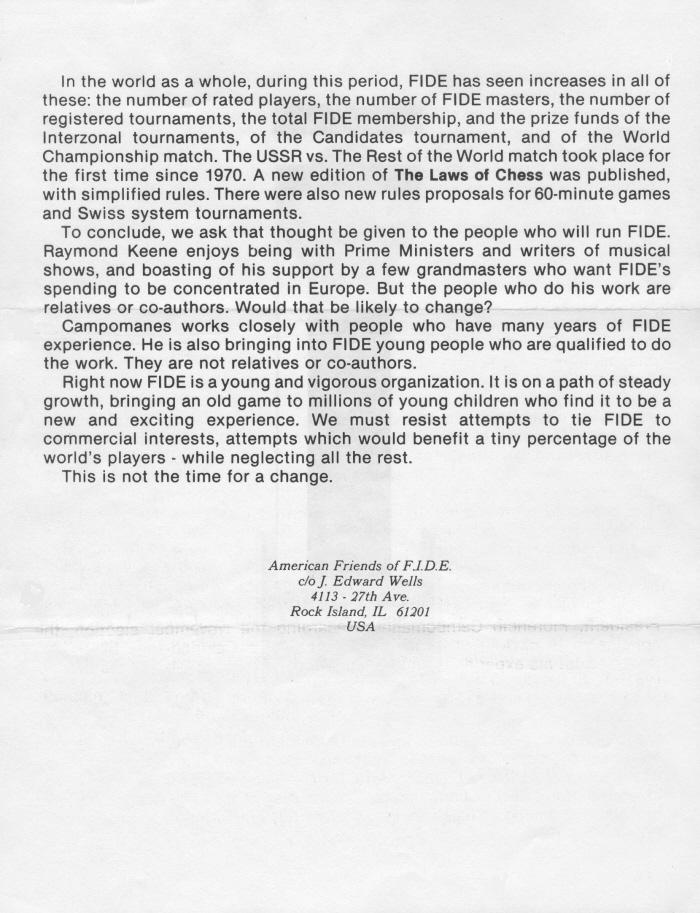
The outcome of the campaign was reported by Don Schultz, the US Delegate to FIDE, on page 53 of Chess Life, March 1987:
‘FIDE President Florencio Campomanes was easily reelected. Contrary to rumors and other statements, his election was never in doubt. I informed our Policy Board several months prior to the election that Lincoln Lucena’s challenge for the FIDE presidency had no chance and that mostly likely he would withdraw his candidacy prior to the voting. This was exactly what happened, and Campo was elected by voice acclamation.’
An endnote on page 270 of Chess Explorations quoted from page 219 of Kasparov’s Unlimited Challenge (Glasgow, 1990):
‘The anti-Campo forces could muster so little support that there wasn’t even a vote.’
The full text of C.N. 1281 is given below. Published in the November-December 1986 issue of Chess Notes, it shows how a journalist (Bernard Cafferty, the then editor of the BCM) who refused to stand up to Raymond Keene was dragged down by him:
Now we are obliged to turn, without fear or favour, to the BCM.
With reference to the time when Mr Keene’s telex was sent to Moscow and Lucerne (C.N. 1245, first paragraph) we wrote a letter to the BCM Editor on 12 September. Its principal object was, of course, to highlight the contradiction over the timing:
‘Mr Keene now says that the telex was sent during the morning of 15 February on the basis of an inaccurate radio report, which he himself had not actually heard, that the match had already been terminated. But that is contradicted by his own words on page 139 of The Moscow Challenge: “At this point [i.e. after both Kasparov and Karpov had agreed to accept or abide by the termination decision] I telexed Moscow with a proposal in my capacity as President of the Commonwealth Chess Association.”’
Some of our letter is given in the November BCM (page 513). Astonishingly, the above key paragraph has been removed. The Editor then declares the correspondence closed, on the grounds that ‘it seems unlikely that the interested parties are going to give satisfaction to each other’. (!)
It will be recalled that paragraph c) of our 8 May letter to Mr Cafferty (which we published in full in C.N. 1222) pointed out another indisputable contradiction by Mr Keene (about return matches). That too was edited out (June BCM, page 257).
The BCM’s presentation of recent political matters has to be criticized. Instead of discussing issues and policies it has concentrated on facile anti-Campomanes jottings. Fundamental points have been passed over with alarming regularity; errors of judgement have been frequent. Criticism of Raymond Keene has never been initiated, and the news columns have reported other people’s complaints about him only in coded language subtle to the point of inscrutability. Some examples (all page references are to the 1986 BCM):
i) Page 176 refers to the ‘FIDE Pagination Affair’, and in the following issue so does Mr Keene (page 208). That is fine, but in that same (May) BCM the Editor reverts to the matter no fewer than three more times: page 177, page 189 and page 195.
ii) Page 225 refers to (and page 235 quotes) some ‘unparliamentary language’ by FIDE about Mr Keene. Yet the BCM had never mentioned or cited any of Mr Keene’s anti-FIDE vituperation (to which the Federation was reacting in the BCM reference). Nor has it done so since. (An opportunity came when the front page of the Guardian of 6 August 1986 was bedecked with some cursing by Mr Keene, in an argument with FIDE about London and Swiss Bank Accounts.) The false impression has thus been given that one side alone (the non-British, of course) has been guilty of verbal indignity.
iii) Here is a quote from the FIDE President’s Circular Letter of 28 April:
‘We expect that the election of President will take [sic – the word place is obviously missing] late November during the Dubai General Assembly, and not until then, when the new President is elected, does he nominate the General Secretary for election (a formal endorsement, actually) by the General Assembly.’
That is a perfectly accurate description of the procedure. Note, in particular, the use of the word ‘election’. But now let us see how the BCM summarized the Letter’s treatment of this matter, on page 235:
‘It points out that the post of FIDE General Secretary ... is a nominated (or endorsed) post, not a post subject to election.’
Au contraire! A bad mistake, but worse was to follow. David Anderton was in like a shot with a ‘correction’, on page 301. He quoted Paragraph 5 of the FIDE Electoral Regulations:
‘Nominations and elections for the offices of General Secretary, Treasurer and Auditor shall be made in the General Assembly after the elections of the President and Deputy Presidents.’
... to which the BCM Editor adds the comment: ‘This is at odds with the statement quoted from the FIDE President, page 235 last month.’ In reality, it is at odds only with the misquotation of the statement by the BCM. The magazine has yet to publish a correction.
iv) Page 309, ‘The Things They Say ...’: an example of triviality and bias.
v) Page 446 and the November issue’s Late News: The reaction to the American Friends of FIDE Sheets is certainly not hostile, but seems more concerned with speculating on who is behind them than with informing readers of their contents. Obscure code language is used, always to the advantage of the same Gentleman. The BCM reports that the Sheets ‘turned round Kasparov’s use of the word “Mafia” to point out the existence of a closely-knit group around the adversarial party’. To translate into normal English: Sheet 3 lists eight relatives, co-authors and associates of Mr Keene who have been making vigorous anti-FIDE statements in support of his campaign. Then the BCM writes: ‘Other matters ventilated are the position of the Commonwealth, mentioning the boycott by many countries of the Commonwealth Games in Edinburgh, attitudes to South Africa, a Brazilian criticism of Lucena and so on.’ Translation: the Sheets contain an analysis of Mr Keene’s inconsistencies on these topics. Another example is when the Sheets give chapter and verse on Mr Keene’s irregularities in the Termination affair. This is how that comes out in the BCM: ‘the history of the cancellation of the first K-K match, reaction to it from various parties and many related matters leading on to the present election campaign Campomanes versus Lucena/Keene.’
vi) As mentioned in C.N. 1245, Private Eye has been making a series of detailed accusations against Mr Keene. But a reader of the BCM would never know that; page 455 mentions Private Eye, but only to correct its confusion over the difference between the BCM and the BCF (admittedly a topical subject).
vii) Page 508:
‘As noted in the cover Late News last month, the FIDE President issued a formal letter at the end of the London section of the world title match in which he complained about being vilified in the British press and broadcasting media. This seems surprising in one who completed his higher education in the USA and should therefore know the attention sometimes devoted to candidates for high office.’
Where on earth is the logic in that second sentence?
Truly this has been British chess journalism’s darkest hour.
David Anderton died on 1 April 2022. In an article dated 22 July 2023, Raymond Keene wrote of David Anderton:
‘Anderton was a publicly plausible, but privately slippery character. Having pledged his support, and that of the BCF, for my 1986 election bid, strongly supported by Kasparov, to unseat Florencio Campomanes, the then president of FIDE, the world chess federation, Anderton struck a deal with the Filipino to stab our campaign in the back, in exchange for a top post in Campomanes’ administration.’
For examples of the low quality of the BCM in the late 1980s, see Rebuttals.
An addition on 11 January 2008 to our Termination article:
At chessgames.com on 10 January 2008 Raymond Keene wrote the following (quoted here in full):
‘<sitzkrieg> you are in violation of the guidelines and your comments shd be taken down-however i cant resist pointing out a couple of things-
1 i have never knowingly purveyed any kind of falsehood in anything i have written
2 in the extract you quote winter seems to be unable to reconcile the facts that i sent off a telex message in the morning while elsewhere i refer to my message reaching moscow later that day-what he has forgotten -presumably because he does not get out and about much-is that moscow is three hours later in time than the uk, so it was perfectly possible to send a telex in uk morning time, while at the same time it was much later in the afternoon in moscow! that rather obviously explains why it was possible for me to know about events happening in moscow in their afternoon time while it was still morning time in london. this is so blazingly obvious i have never bothered to point it out before.
on top of that-in spite of winters desperate rearguard actions to defend the now defunct corrupt commie state- history has served its verdict on that disgraceful episode-if any umpire or arbiter in any other sport had halted the contest at the point campomanes did he wd have been lynched!’
Mr Keene mentions only one specific matter, and it is untrue. We have never overlooked the obvious existence of a three-hour time-difference between the United Kingdom and Moscow. Indeed, we drew attention to it in C.N. 1222 at the time the Keene/Tisdall telex came to light: ‘the identical text was also sent direct to Moscow, at 10:13:52 GMT (Moscow time minus three).’
The FIDE Facts sheets were written (solely) by Hugh Myers. On page 193 of his book A Chess Explorer (Davenport, 2002) he commented:
‘I do claim responsibility for the defeat of the Keene/Kasparov coalition. It could be reasonably argued that Campomanes was either a good guy or a bad guy, but I’m proud that discovering the truth and telling it proved that his opponents were worse. They haven’t looked any better as the years have gone by.’
On page xviii of the Financial Times (Weekend FT), 6 December 1986 Dominic Lawson wrote an astoundingly biased account of the FIDE election which read as if dictated by Raymond Keene himself.
Below is an item of campaign literature issued by the Lucena/Keene camp which inappropriately bore a BBC logo:
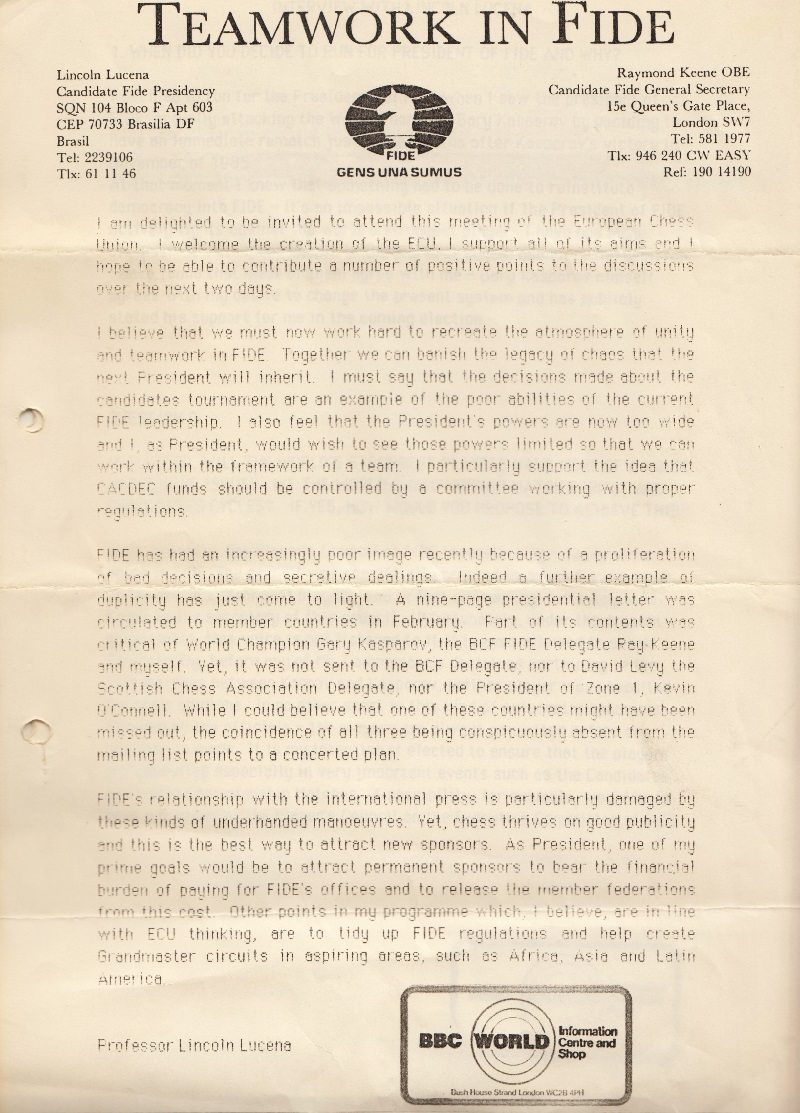
The BBC logo was also on the second page of the four-page document.
From our archives:
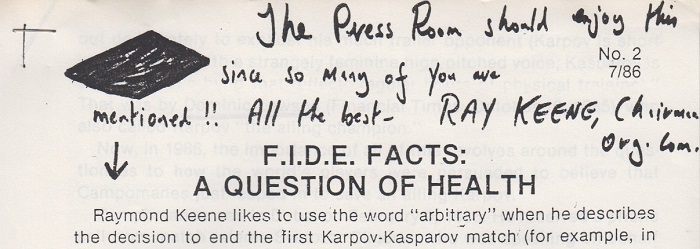
Regarding the reference to Kasparov’s age at the start of FIDE Facts sheet number three, below is what appeared on page 26 of the November 1985 issue of Europa-Rochade:
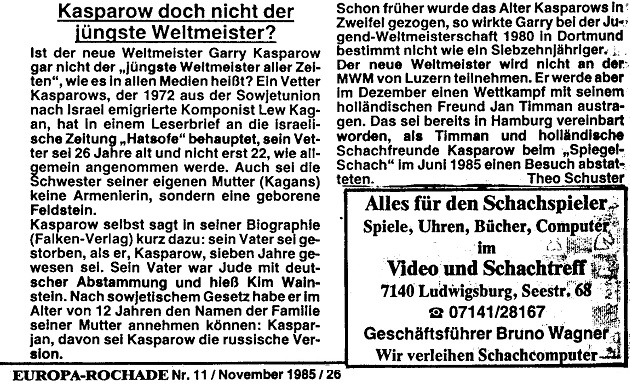
The above-mentioned campaign interviews in CHESS, September and November 1986 are given below in their totality:
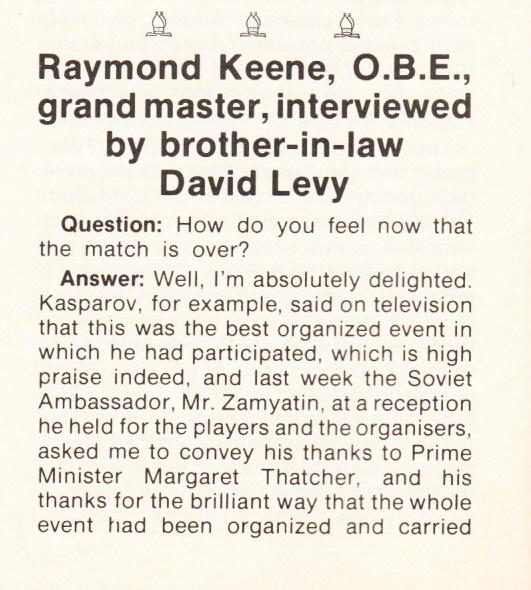
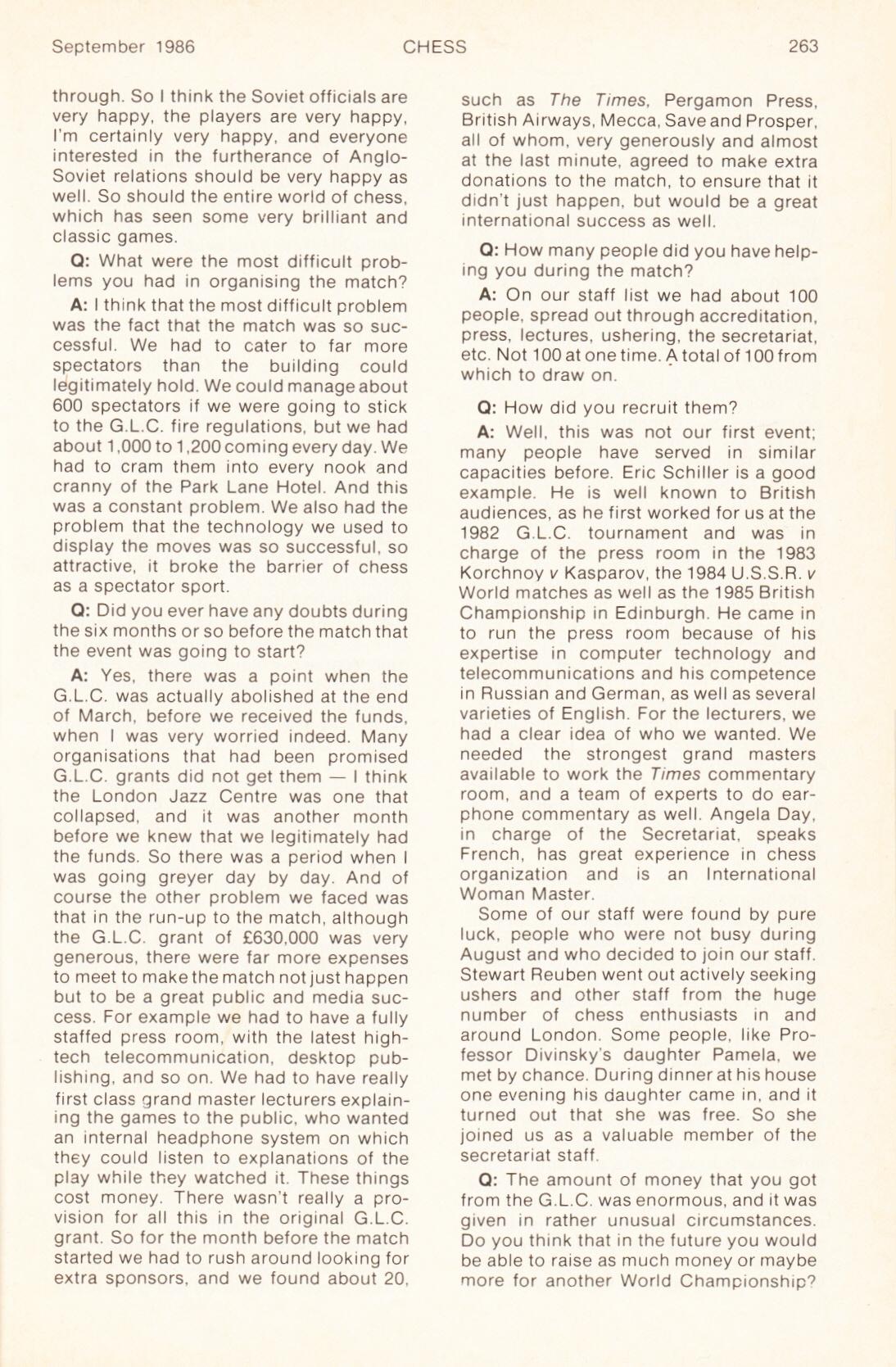
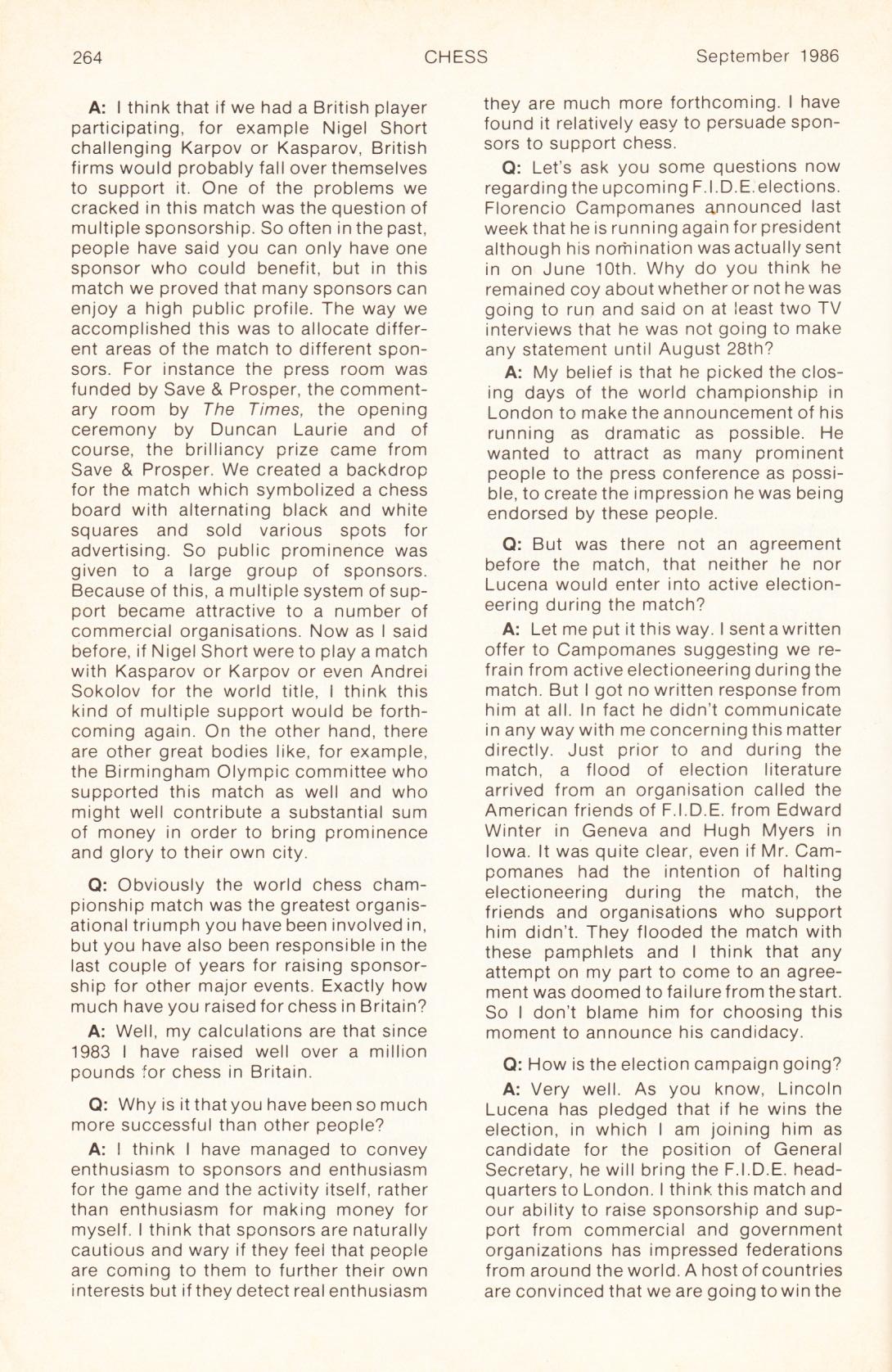
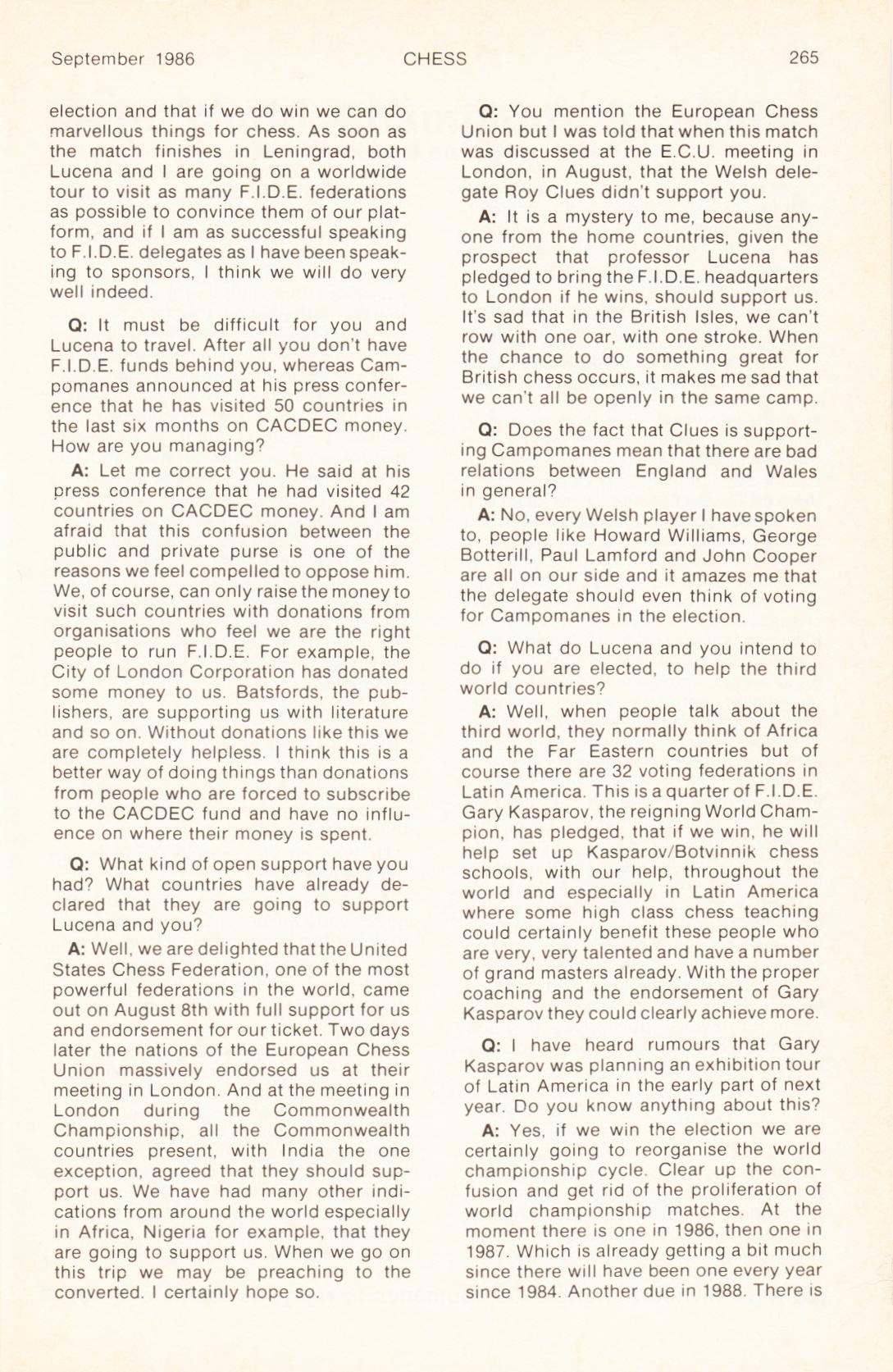
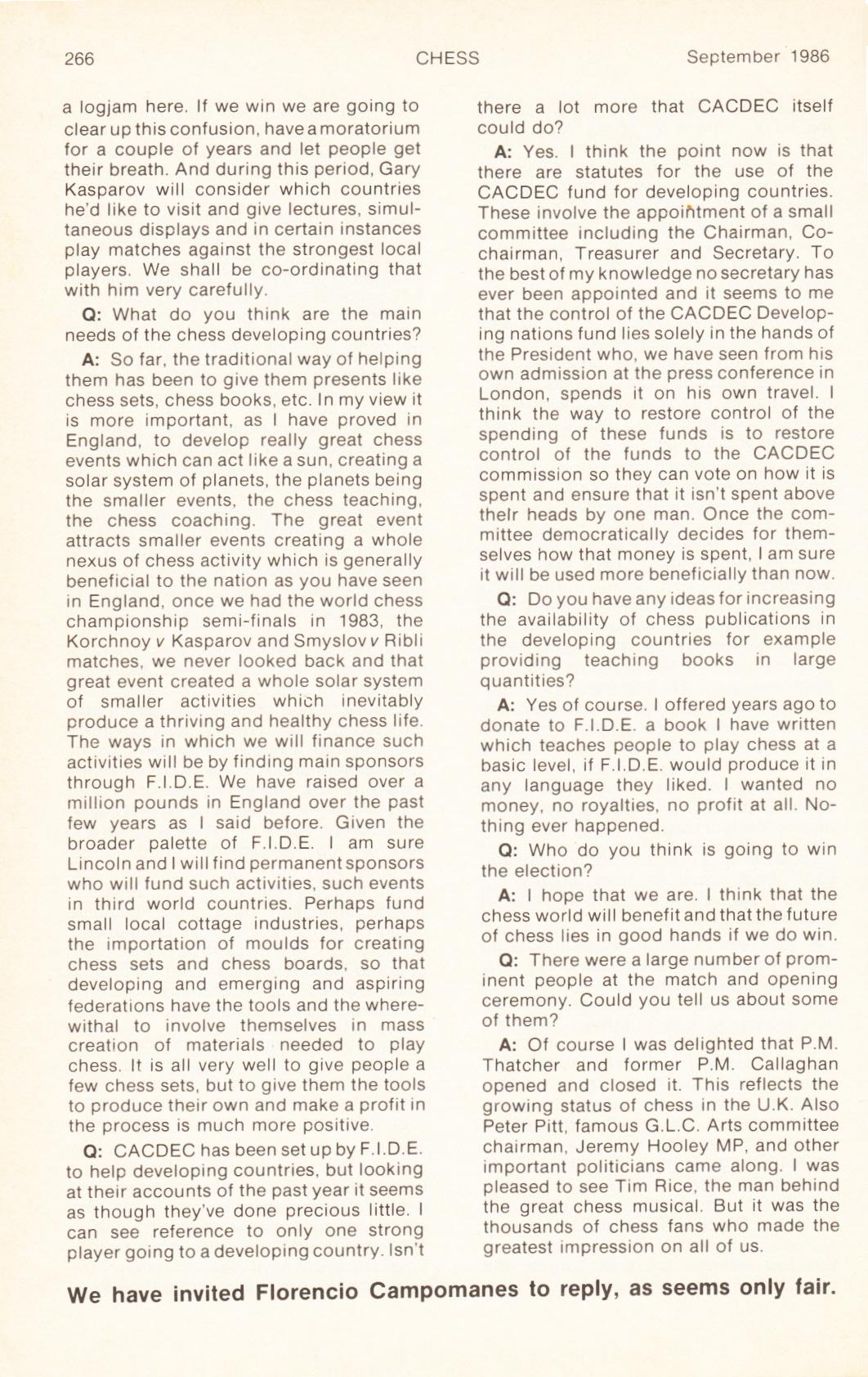
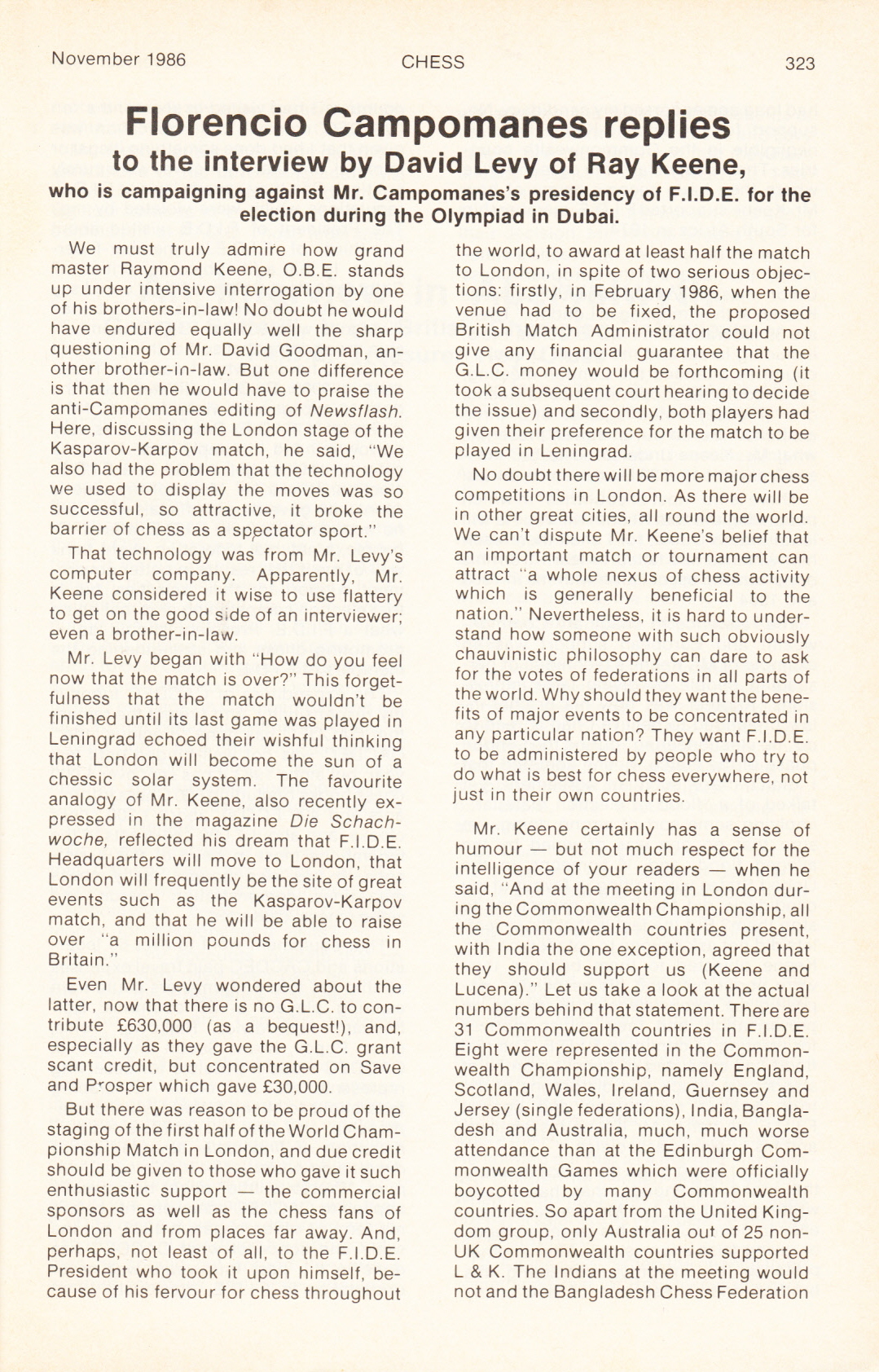
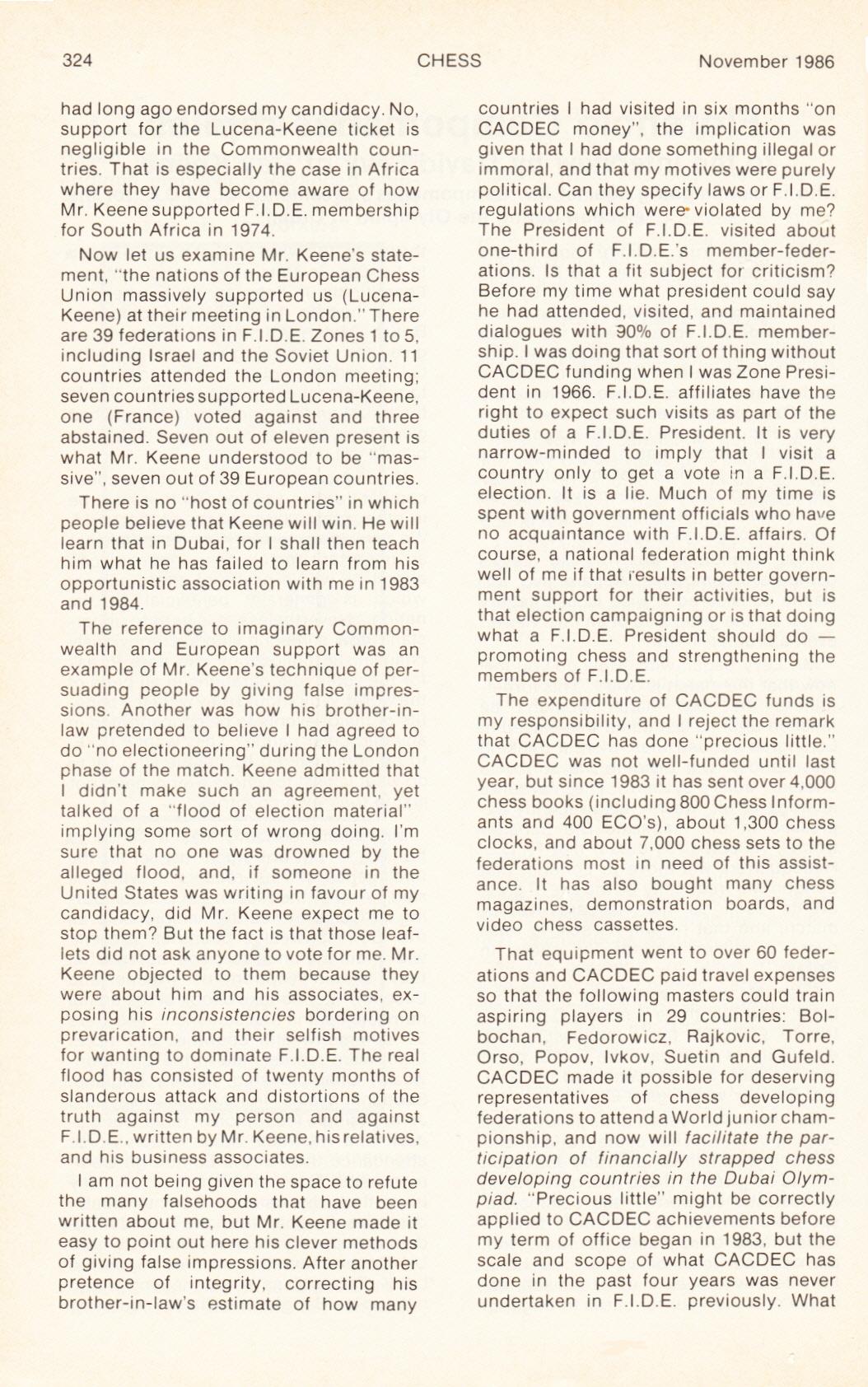
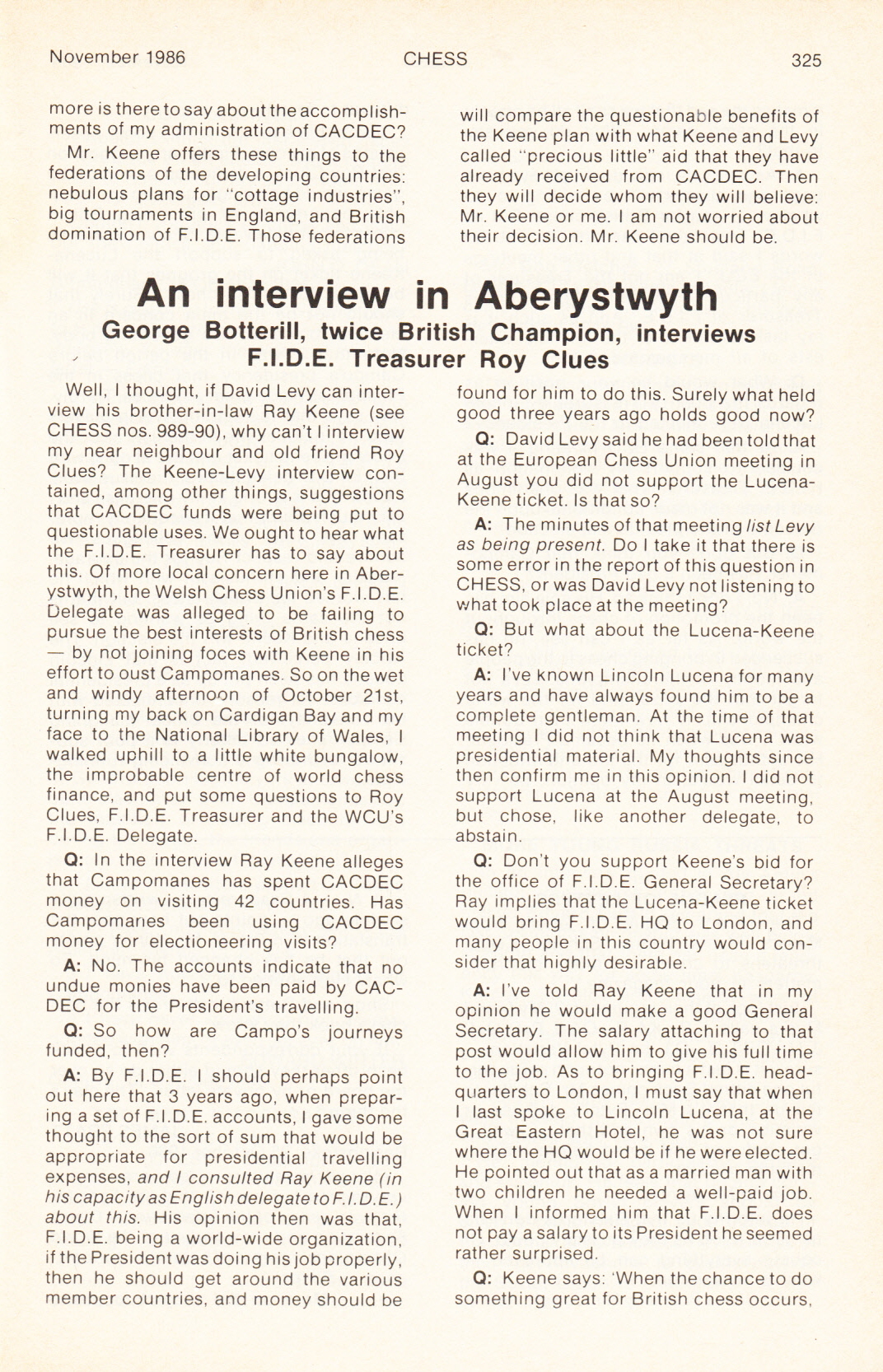
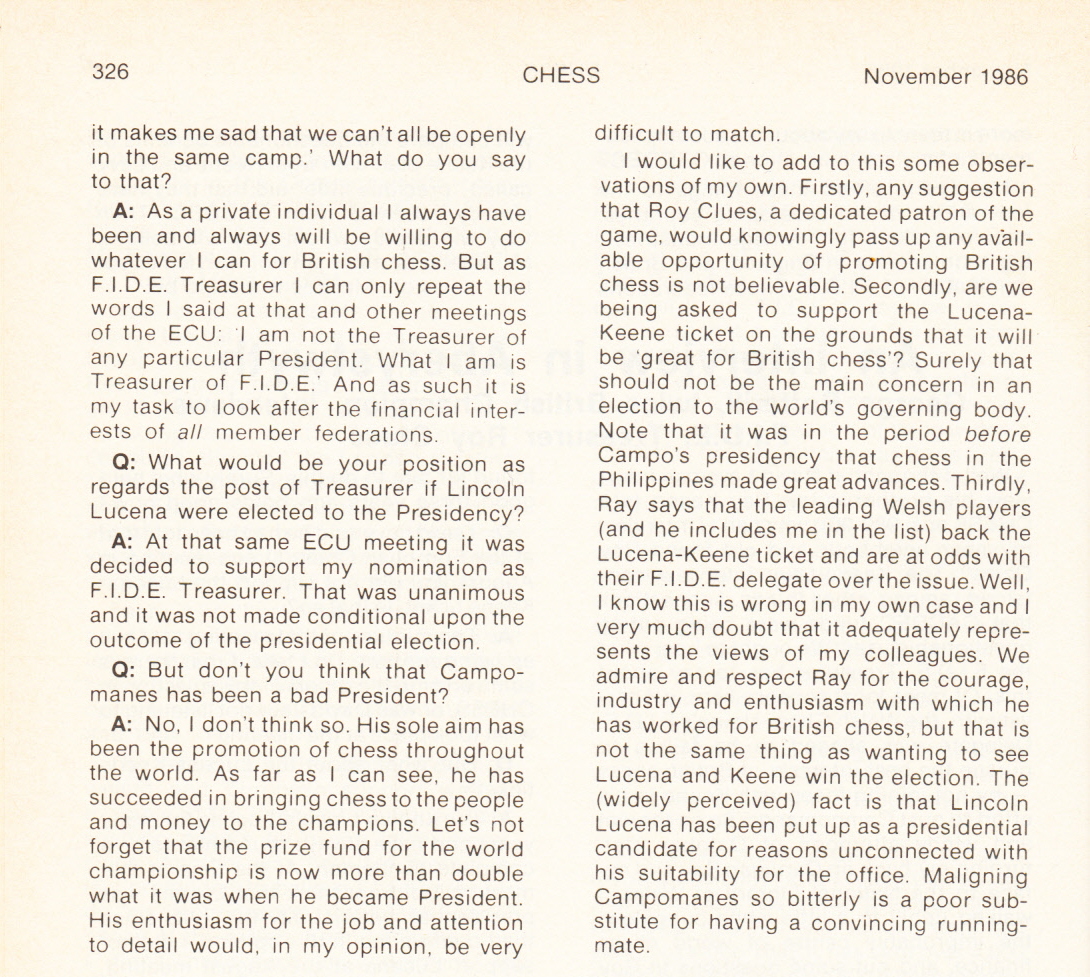
From page 327 of the November 1986 issue of CHESS:
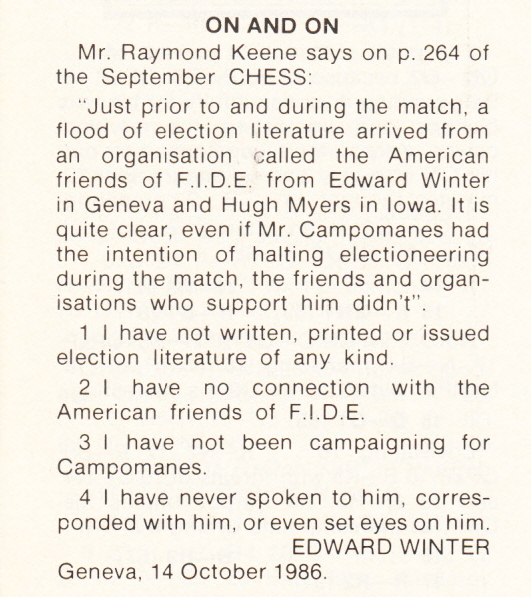
Below are the key parts of a letter to us dated 1 January 1986 from the General Secretary of FIDE, Dr Lim Kok Ann:
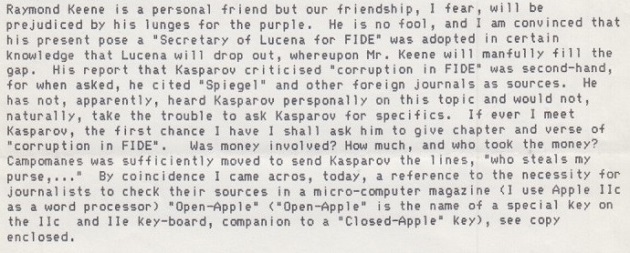


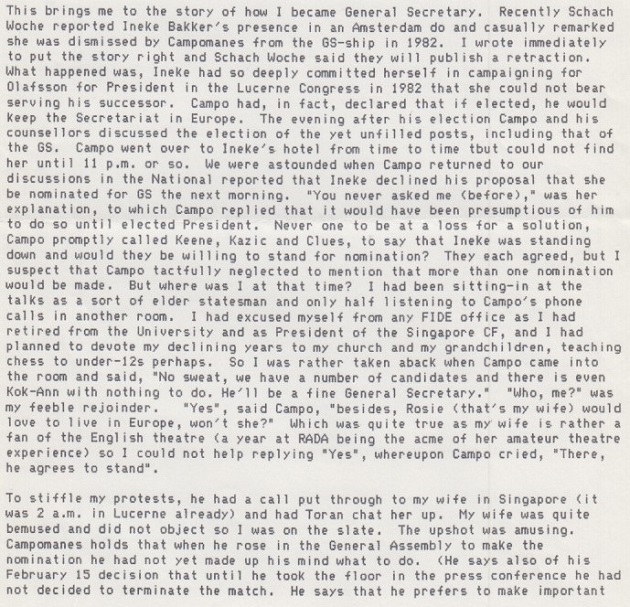
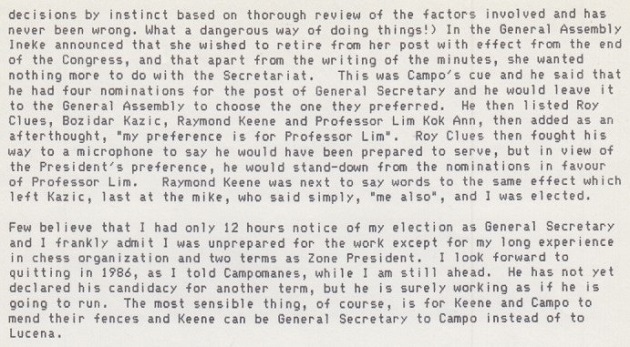
We also reproduce here another letter from Lim Kok Ann, dated 13 January 1986:
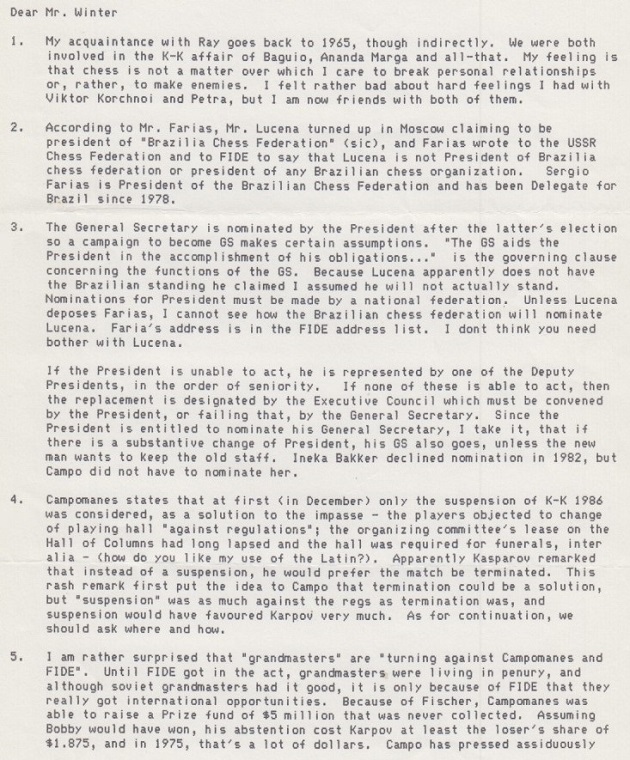
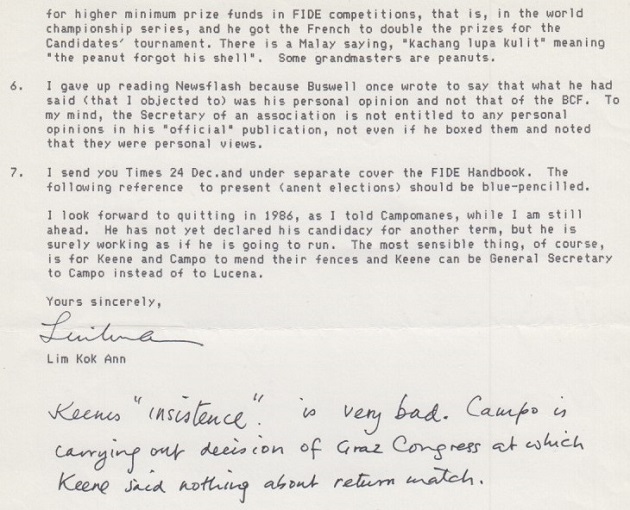
(11856)
Below is the FIDE President’s Circular Letter No. 3 1985/86, dated 25 February 1986. It includes an extensive ‘Review of Press Reports’ by Lim Kok Ann, the Federation’s General Secretary:
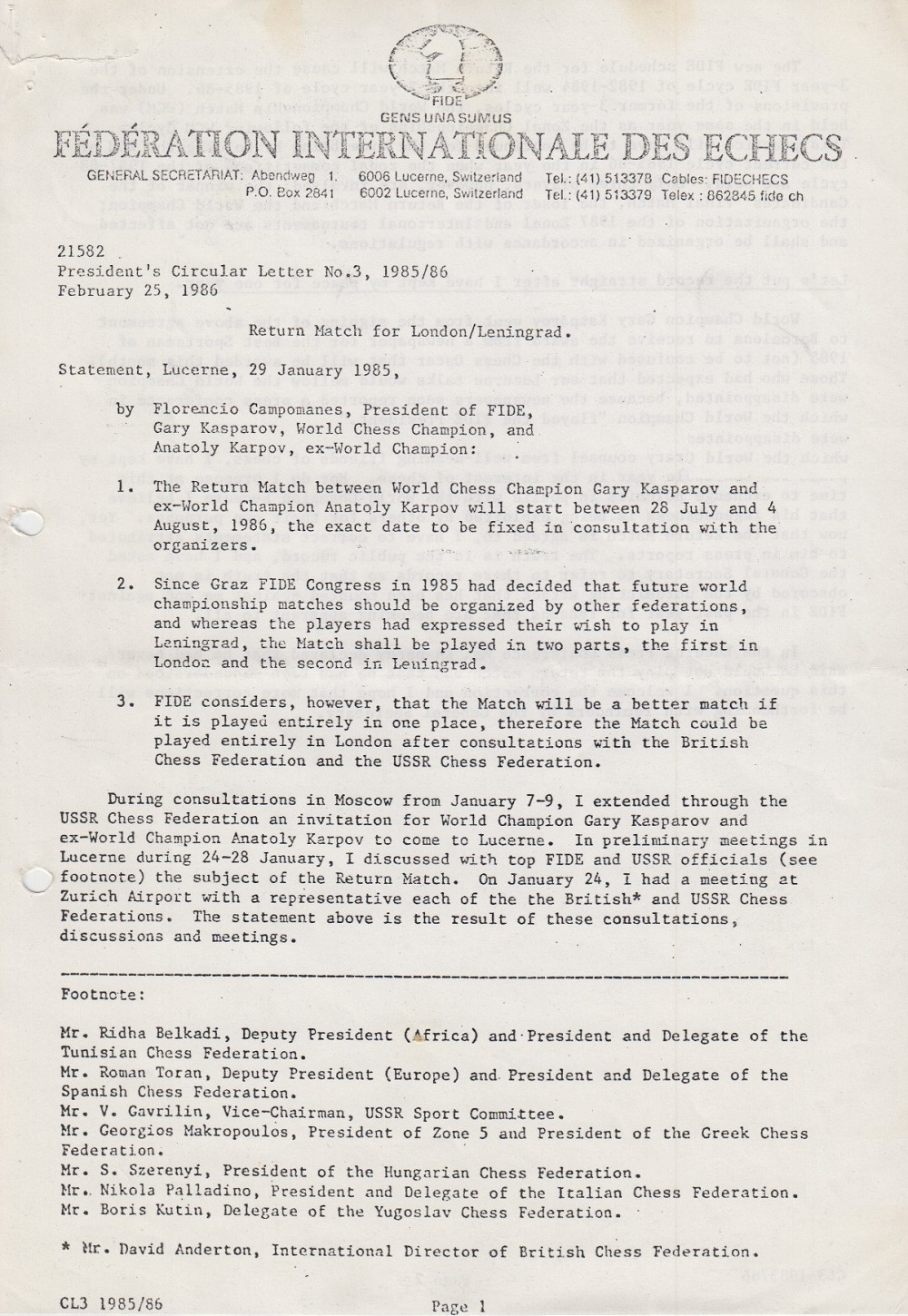
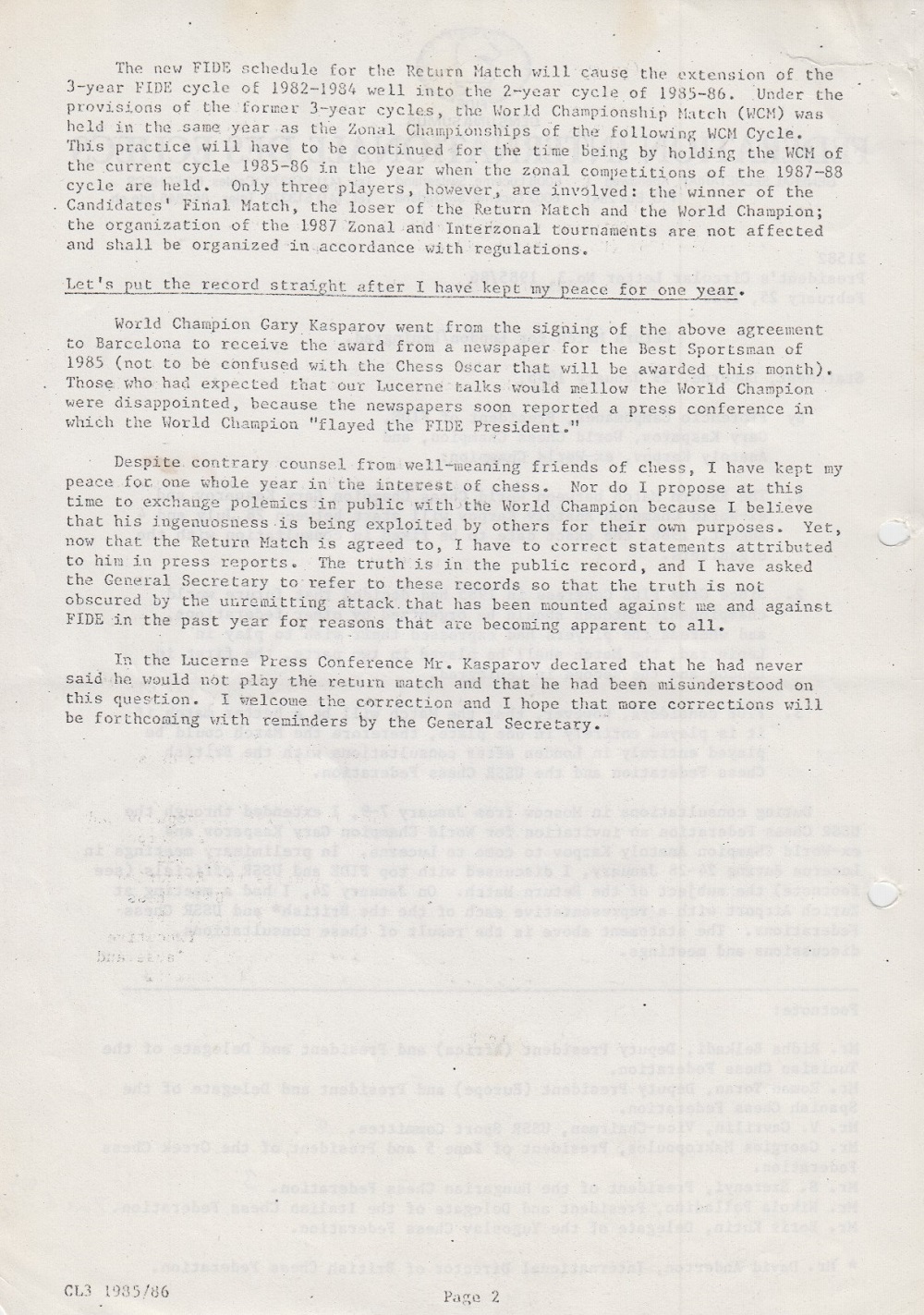
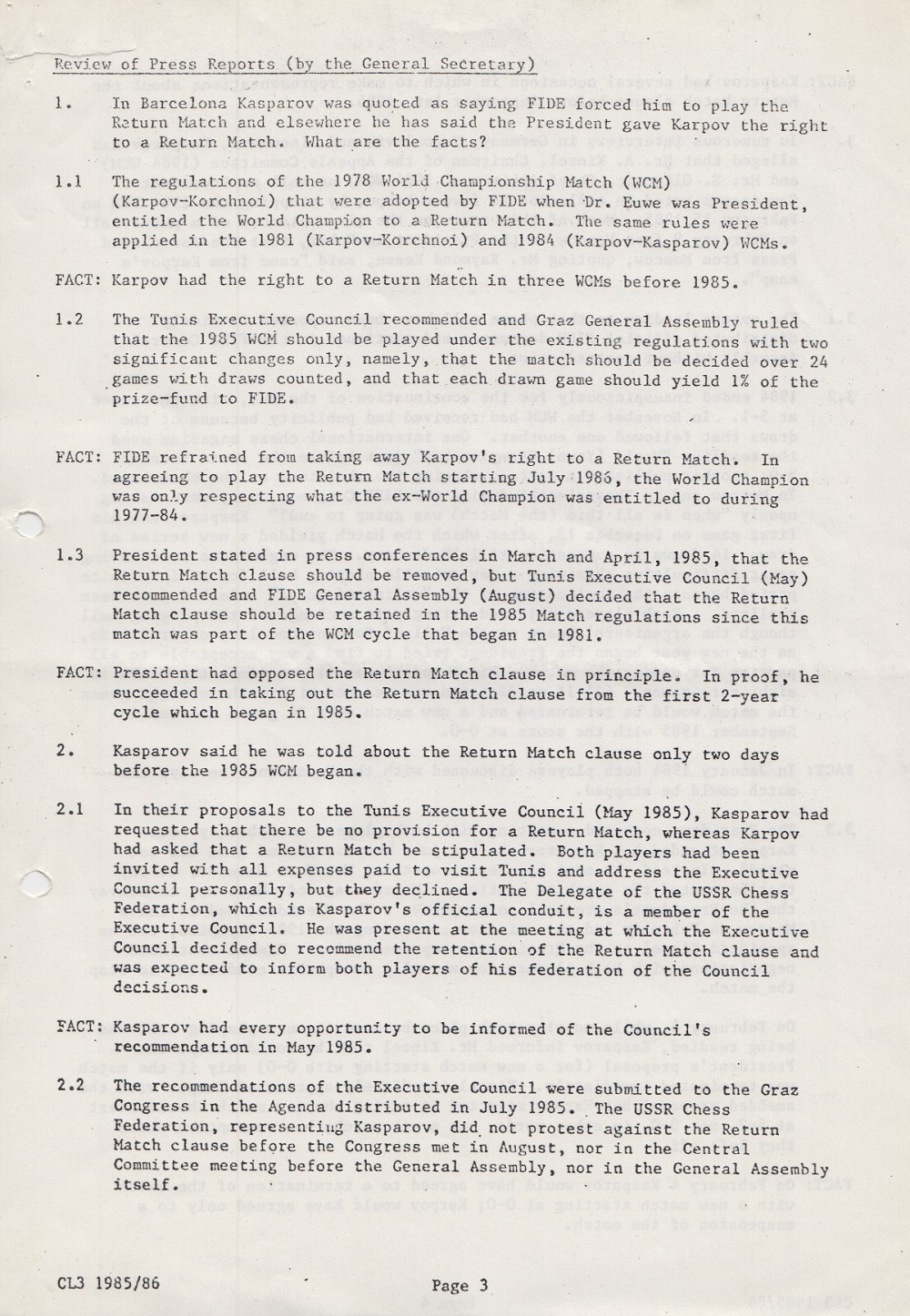
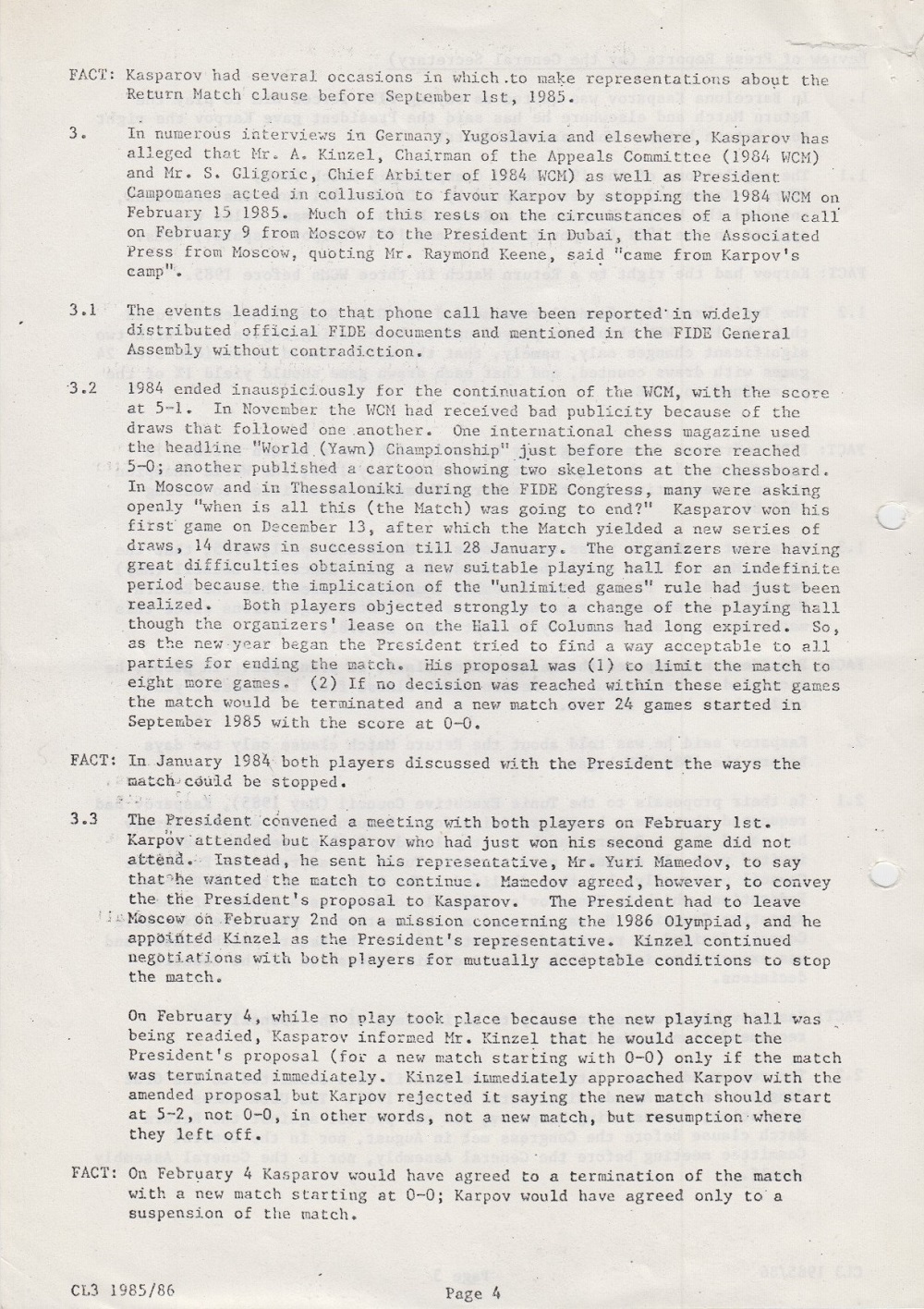
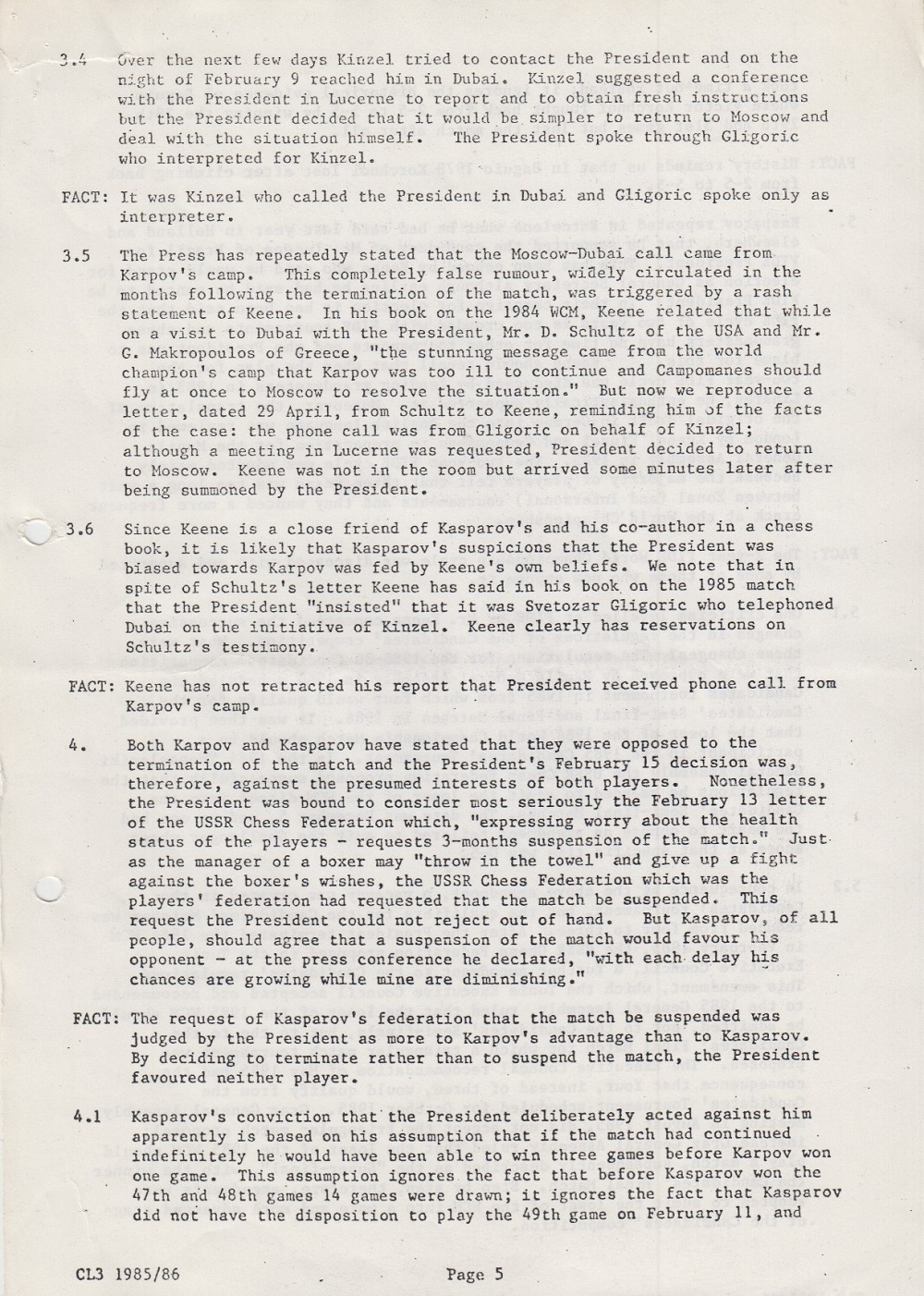
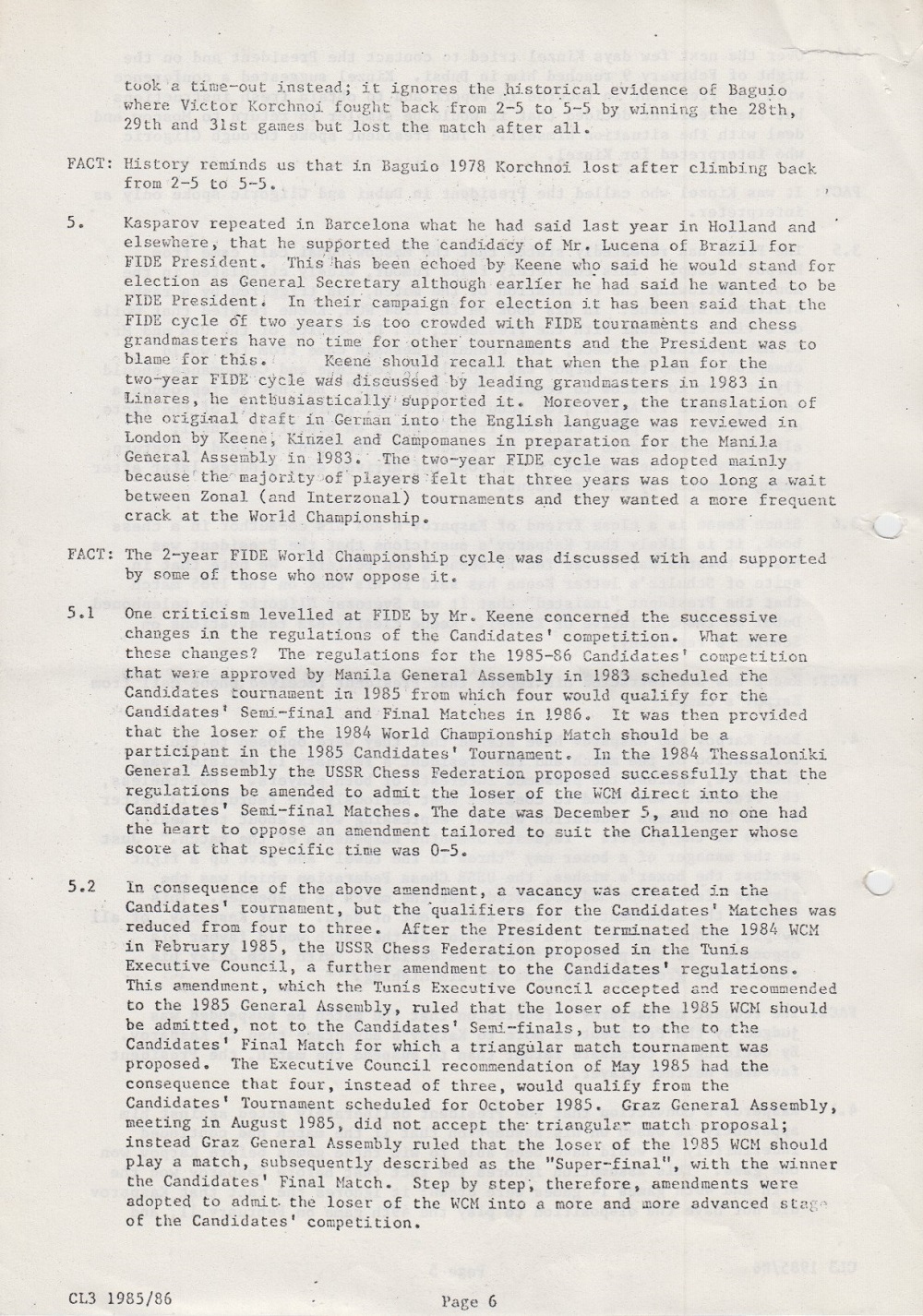
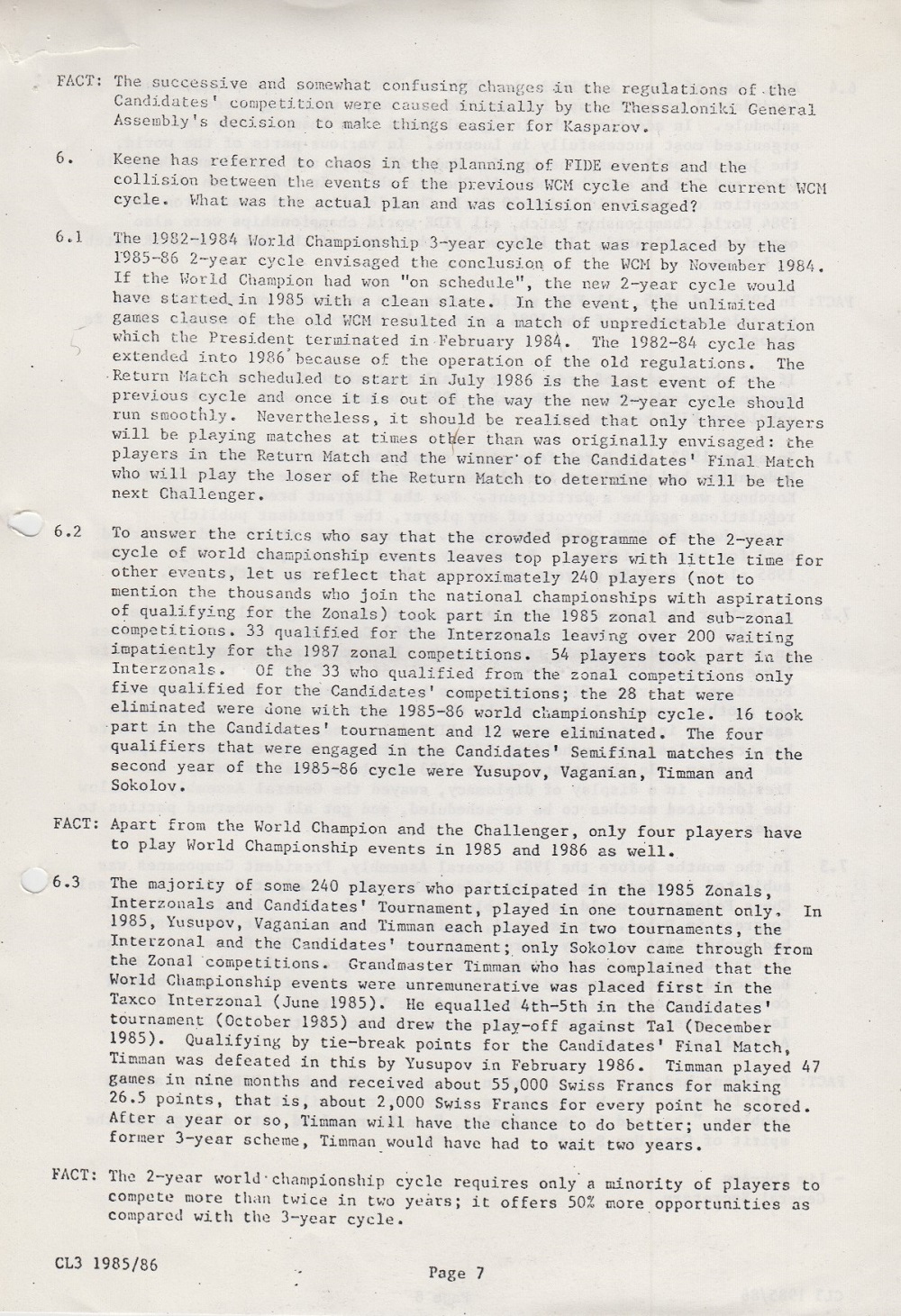
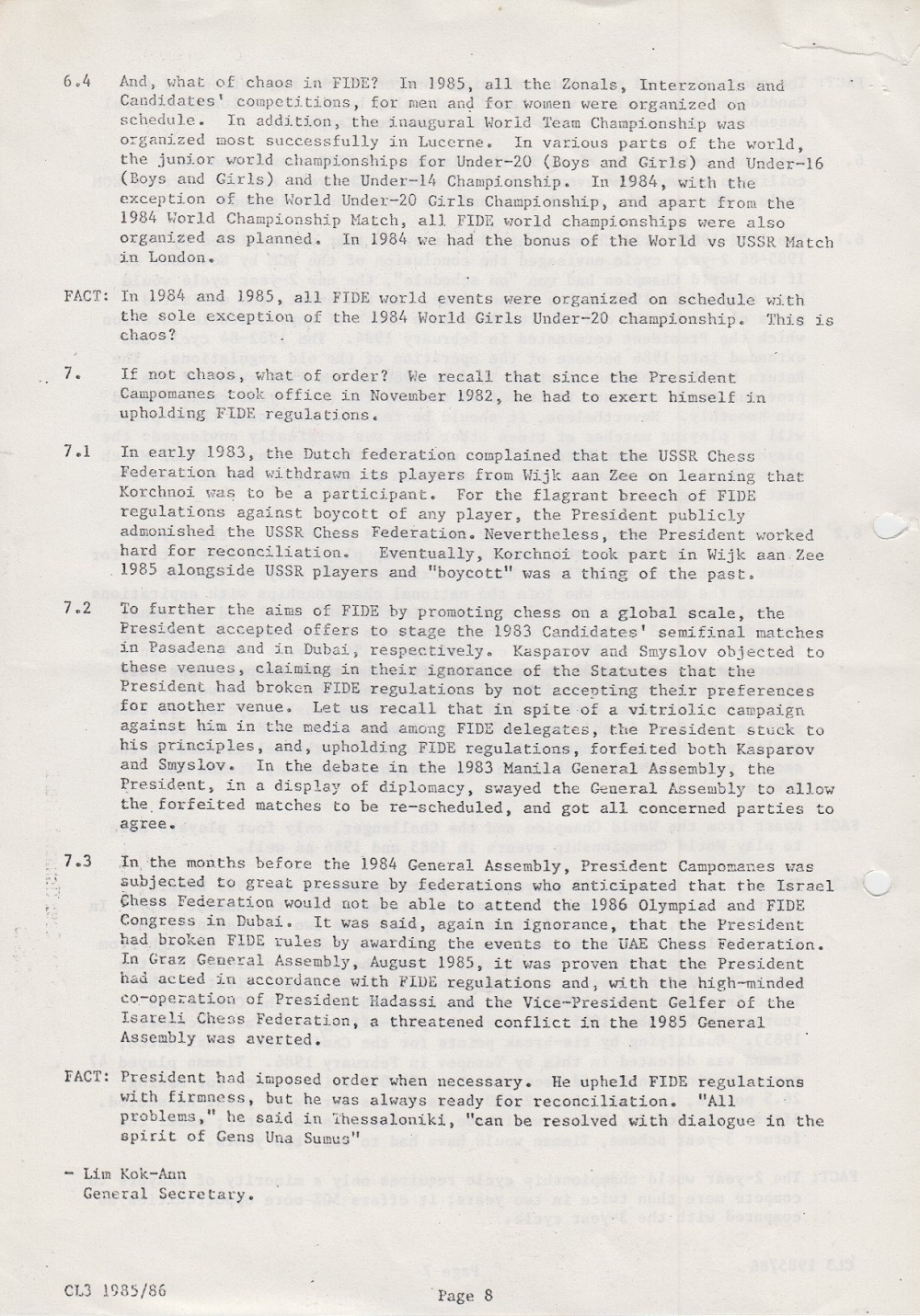
FIDE Facts sheet one above mentioned that Lim Kok Ann’s text was published in the May 1986 BCM, followed by a response from Raymond Keene (pages 188-195 and 204-208 respectively).
The text below appeared on pages 1-2 of the FIDE President’s Circular Letter No. 4 1985/86, dated 28 April 1986:

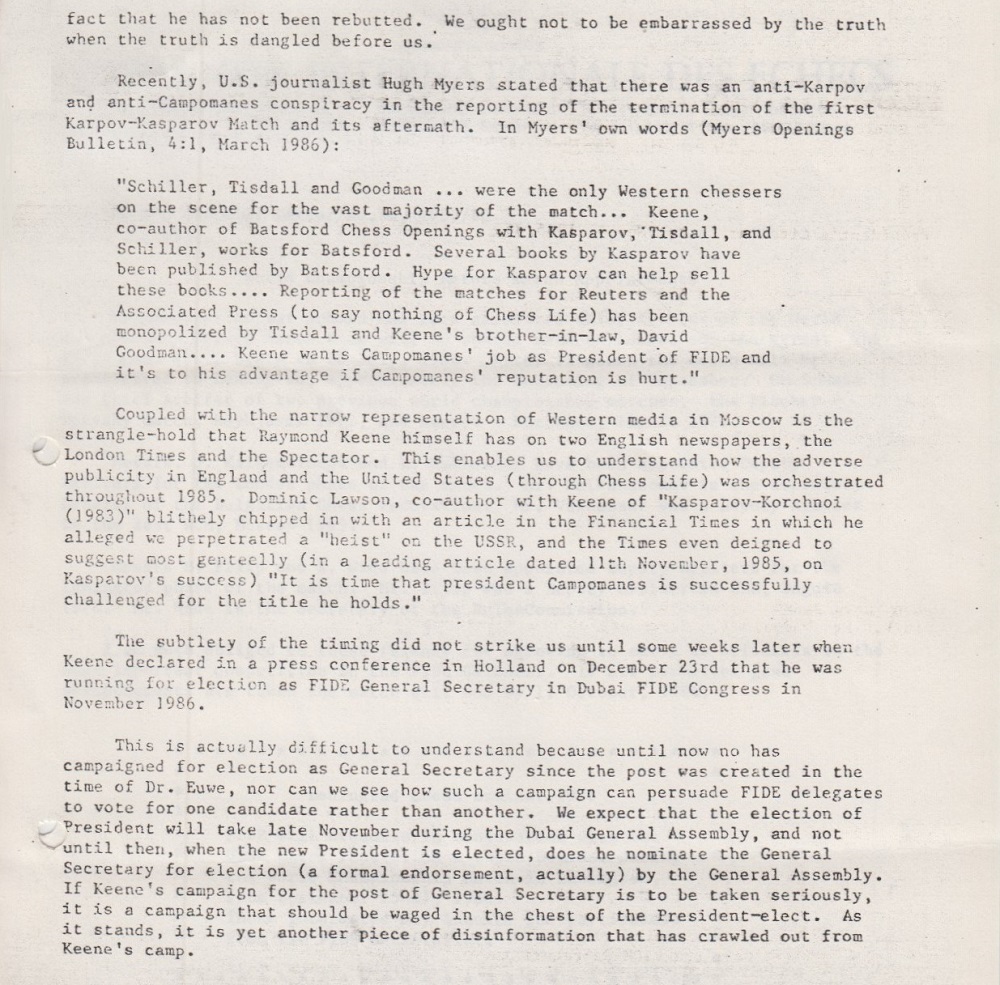
In an interview with Fernando Urías of the Spanish publication Cambio 16, distributed by FIDE to chess federations and journalists on 31 March 1987, Florencio Campomanes answered questions about the 1986 campaign:
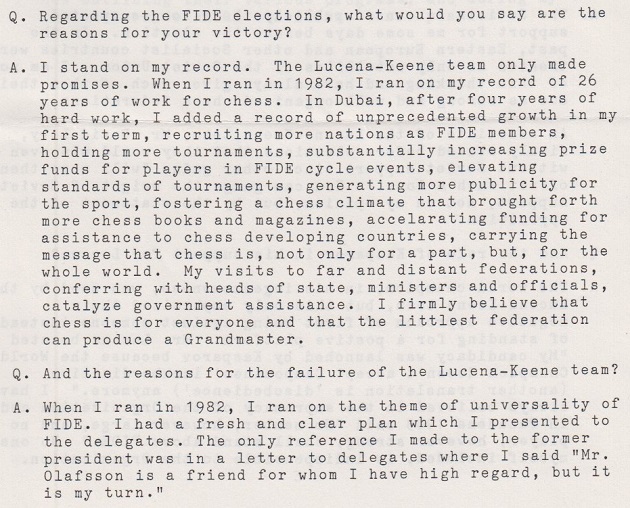
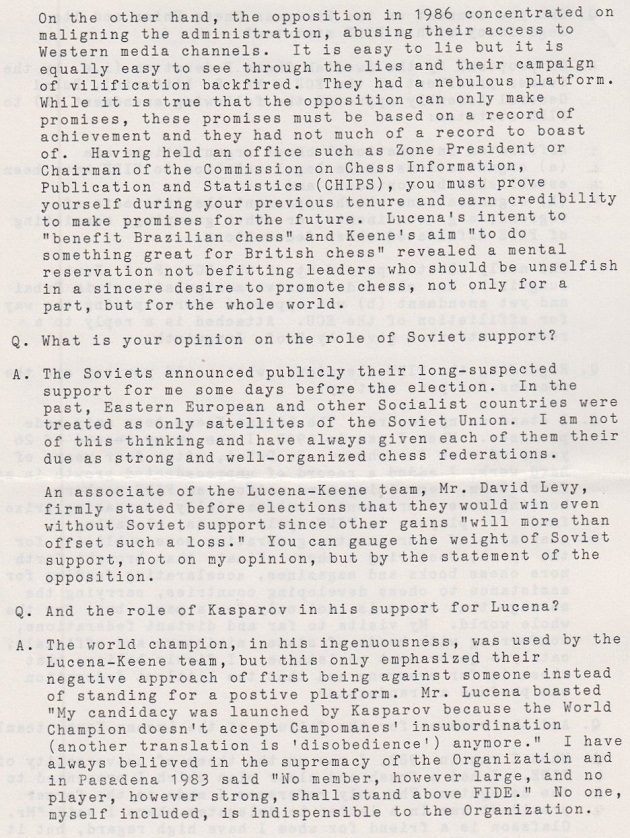

We have found no serious, considered statement by the defeated candidates regarding their last-minute abandonment of the campaign in November 1986. See, however, Comic Relief: Raymond Keene and Chess Politics, which includes this statement by Keene in an interview on page 202 of the April 2017 BCM:
‘One of the reasons I did not stand a fair chance in 1986 is because we just had a war with Argentina.’
The Falklands War had ended on 14 June 1982.
Concerning the Commonwealth Women’s Chess Association (see FIDE Facts sheet six), below is a sample from its documentation:
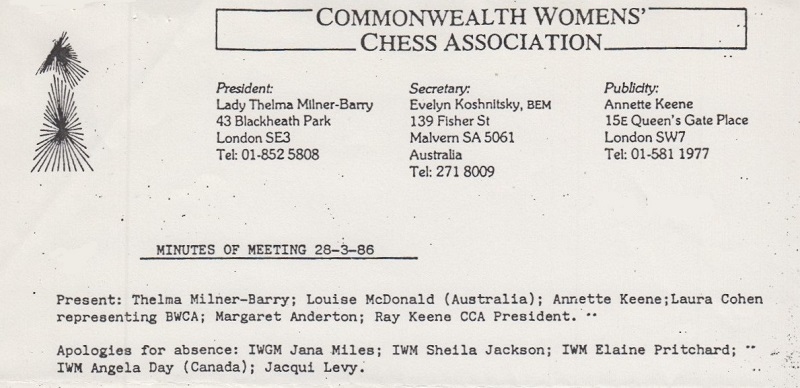
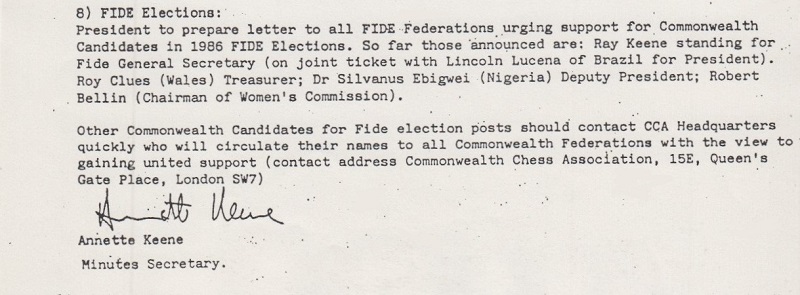
The letterhead even blunders in the title of the Association, but that was not the fault of the supposed Secretary. On 20 June 1986 Evelyn Koshnitsky informed the FIDE Headquarters in Lucerne:

Having quoted the above in C.N. 1245, we commented:
If such improbity had concerned Florencio Campomanes rather than Raymond Keene a certain closely-knit group would have had the story on all the front pages in less than no time.
‘I’m not good at attention to detail’, stated Mr Keene uncontroversially on page 17 of the November 1990 CHESS.
With regard to FIDE Facts sheet number three: Is this the only time in chess history that the members of an alleged chess mafia have been named?
Postscript concerning the 15 February 1985 telex discussed in the first FIDE Facts Sheet above:
We can make no sense of Jonathan Tisdall’s contributions to a Twitter thread in February 2021:
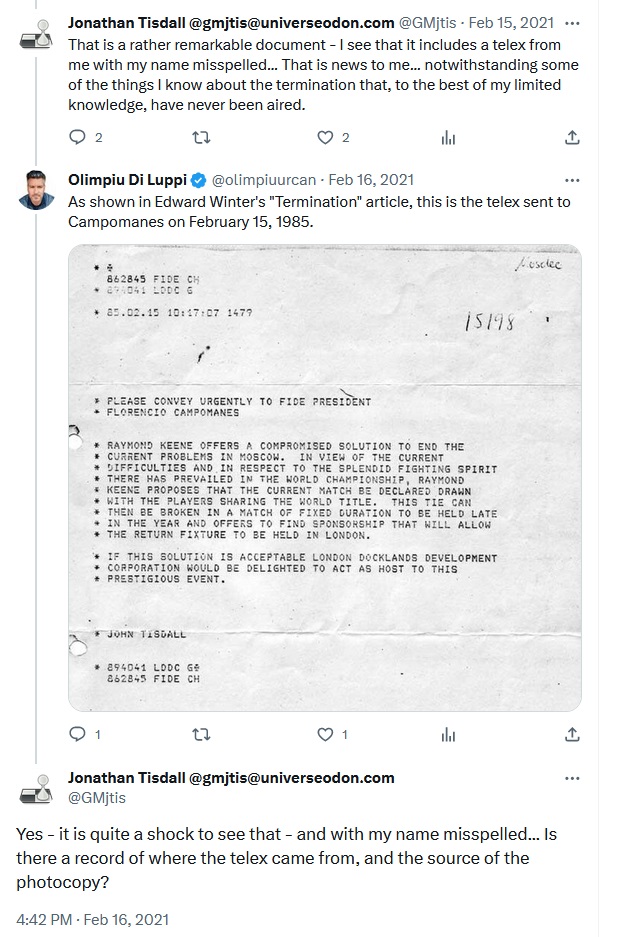
On 12 April 2024 Jonathan Tisdall specifically stated on X/Twitter, in reply to Olimpiu G. Urcan, that he had no knowledge of the 1985 telex until 2021:
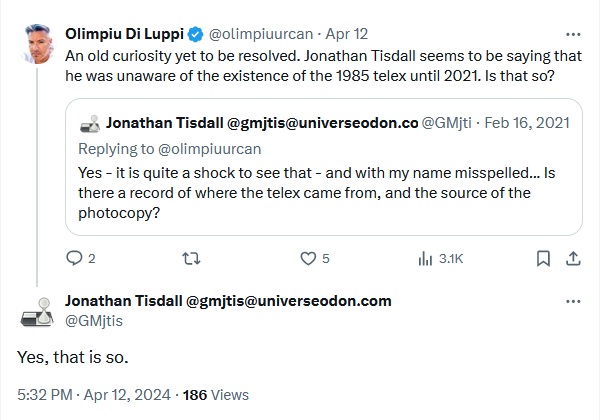
However, our article on the Termination quotes the following from pages 263-264 of Moscow Marathon by J. Speelman and J. Tisdall (London, 1985):
‘General speculation filled in the silence while play was again postponed on the 13th (Campomanes time-out) and Keene called me to draft a proposal that the players be declared co-champions with a rematch of fixed duration to be held in London with the help of the London Docklands. After hurried consultation, this was done and the message telexed to Moscow.’
See also Chess Journalism and Ethics, as well as ‘Ex Acton ad Astra’ on pages 18-33 of the Spring 2007 issue of Kingpin.
A Times tweet posted by Raymond Keene on 16 January 2013:

Links to other feature articles:
The Termination
Comic Relief: Raymond Keene and Chess
Politics
Cuttings
To the Chess Notes main page.
To the Archives for other feature articles.
Copyright: Edward Winter. All rights reserved.